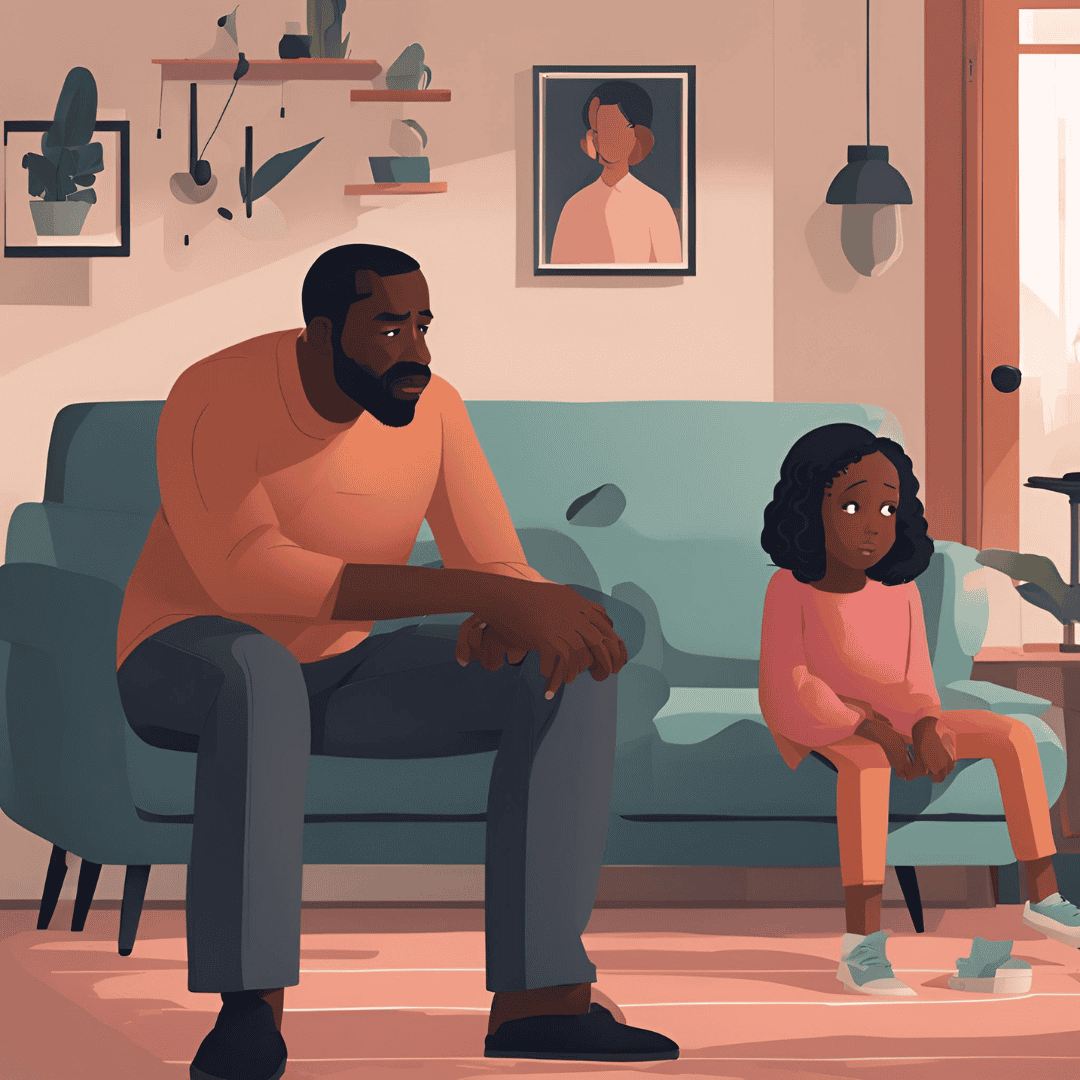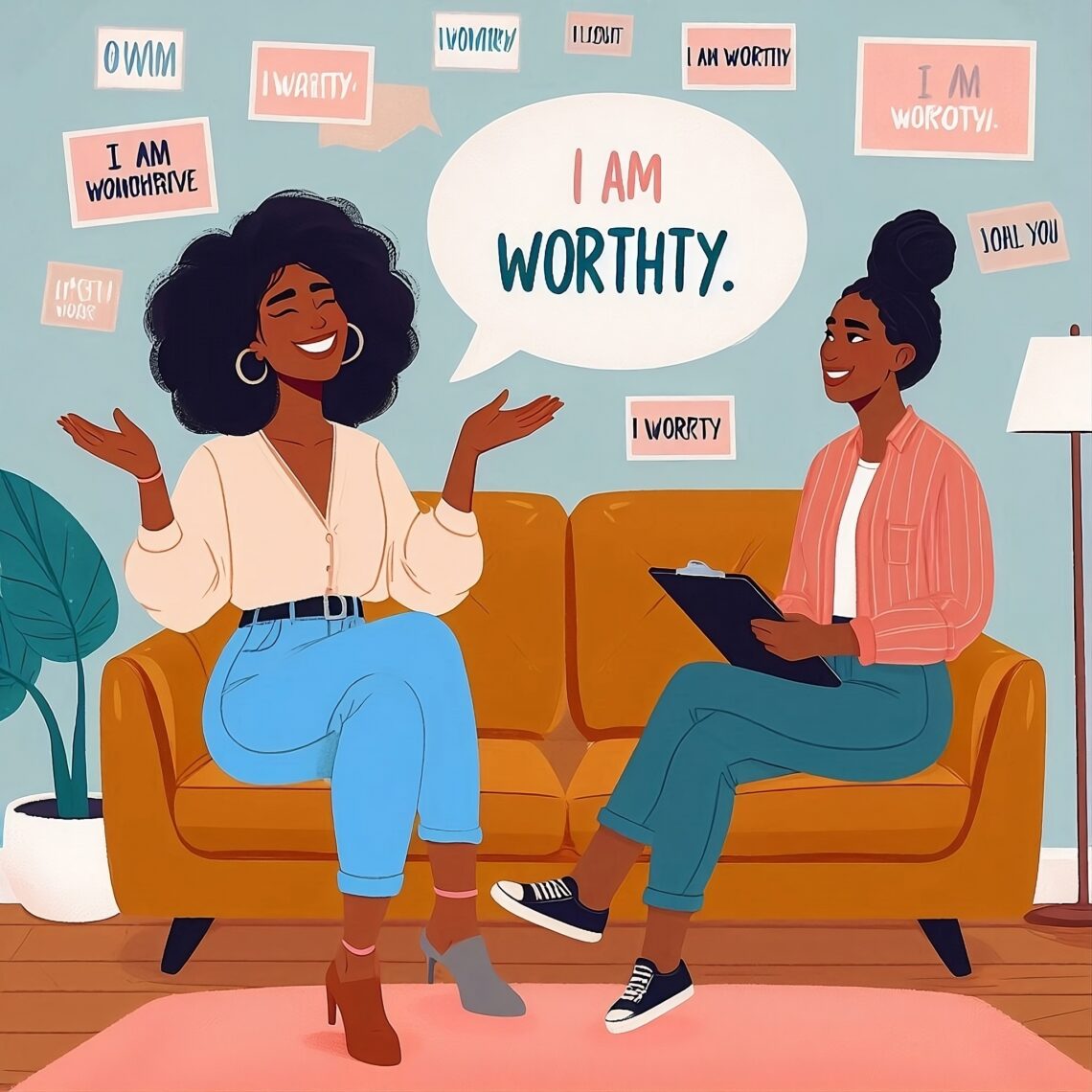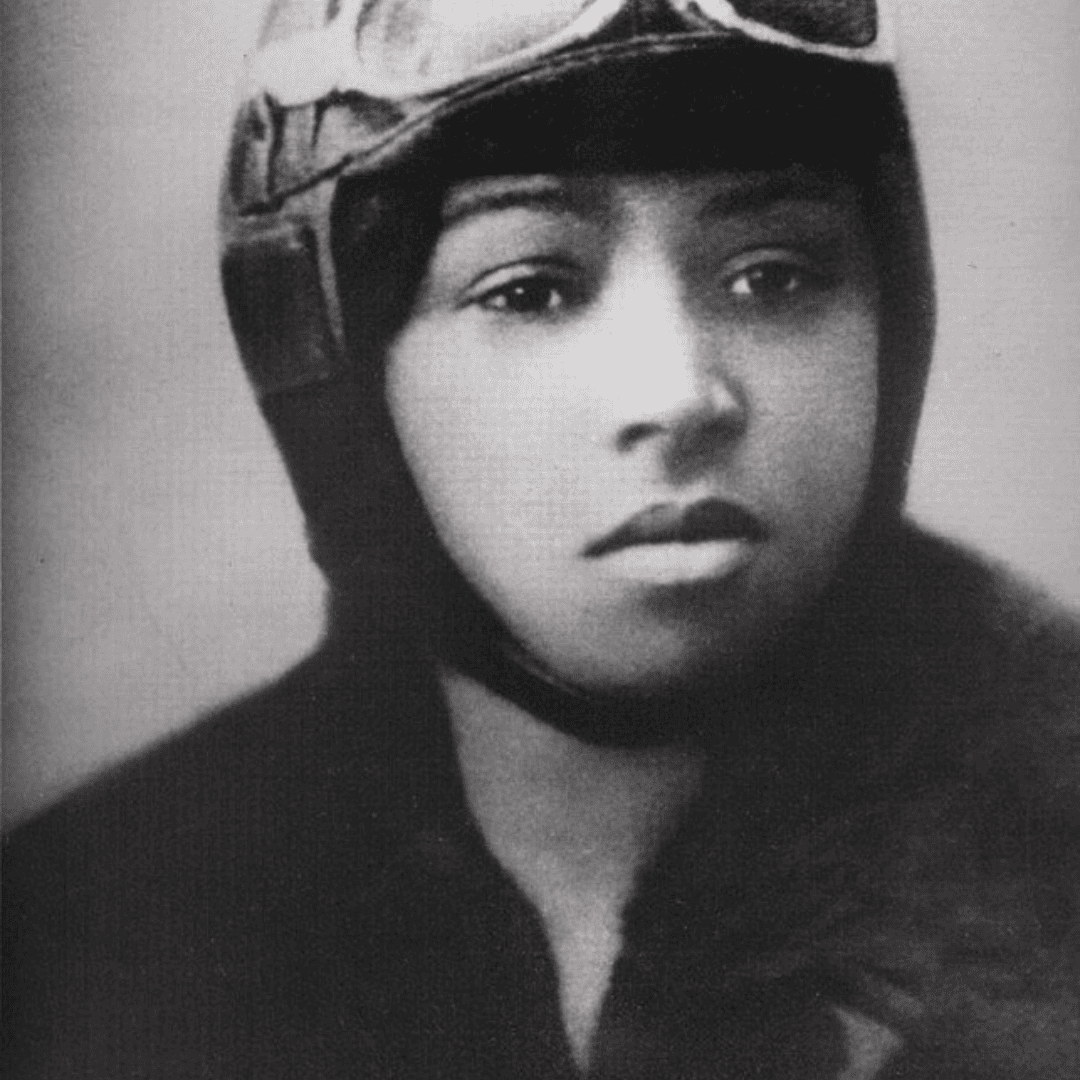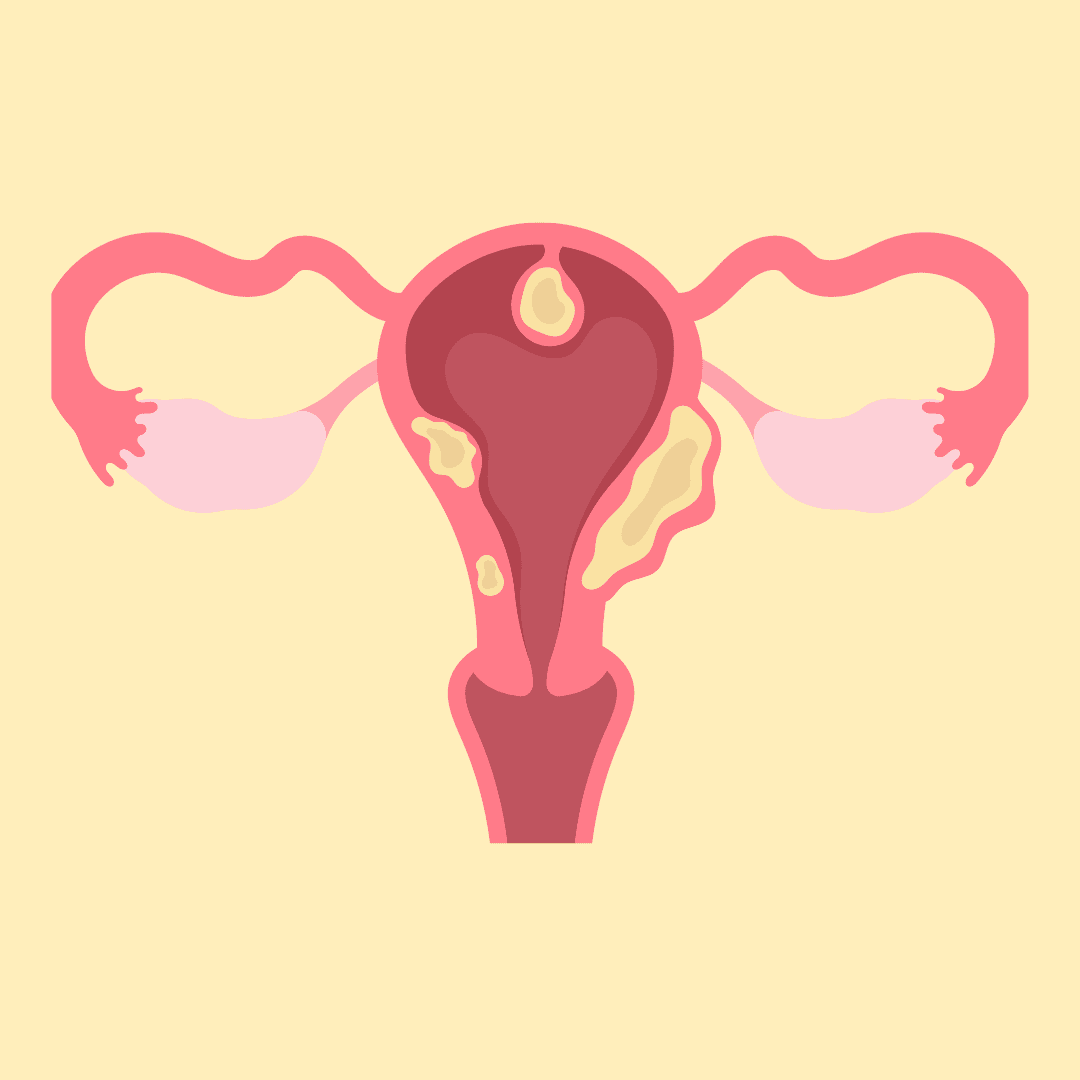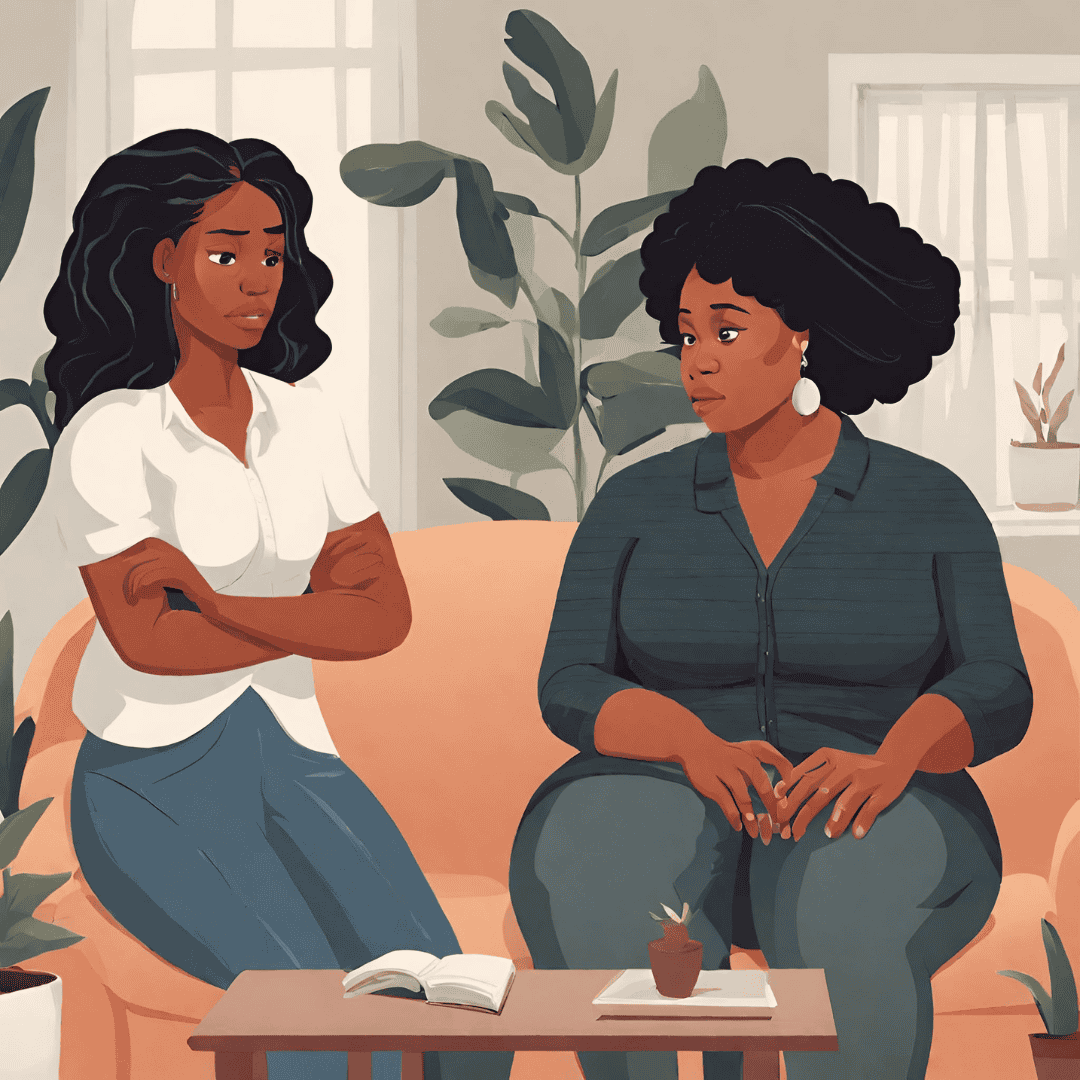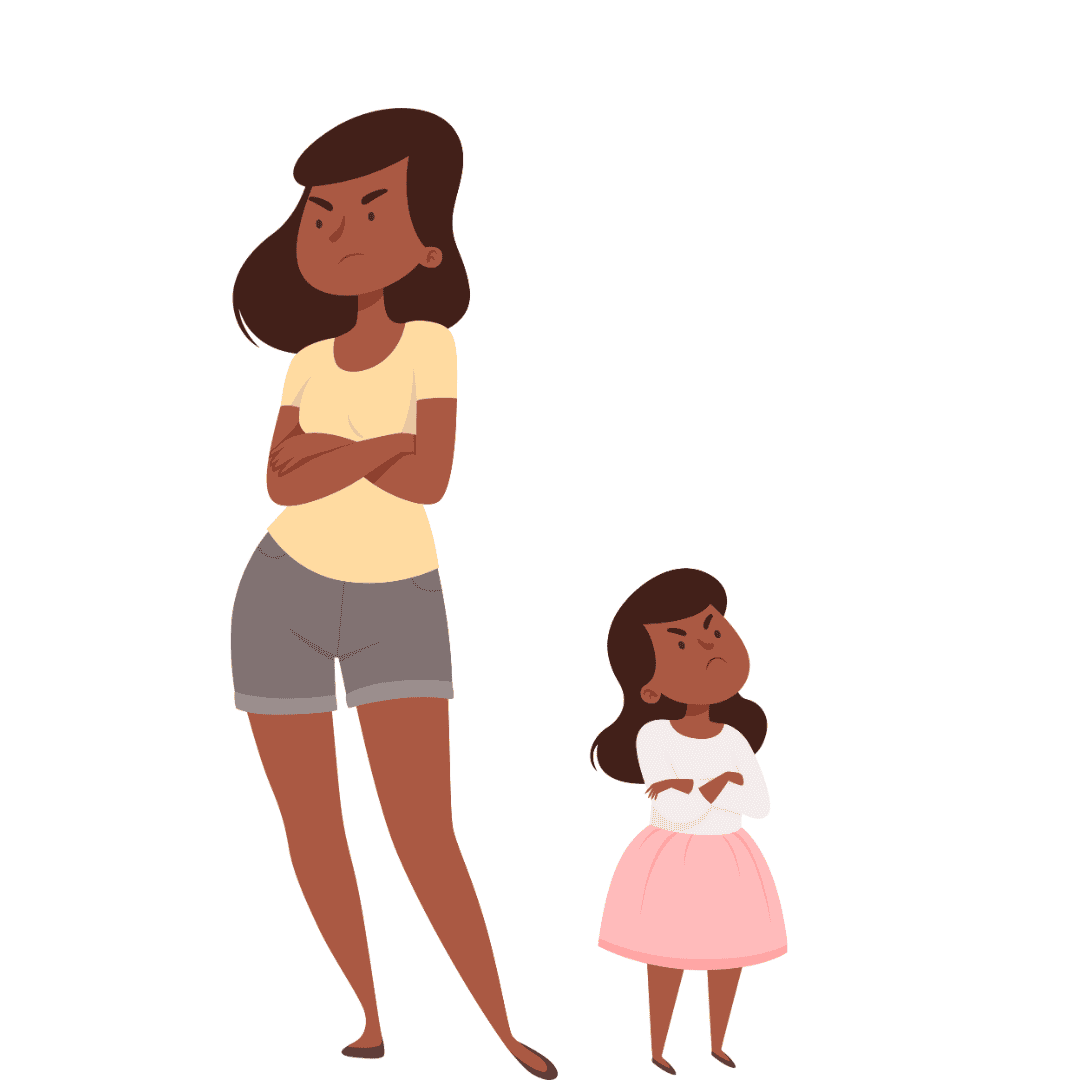-
How Sleep Deprivation Affects Black Women
Did you know that sleep deprivation costs the UK £40 billion a year? Without sleep, we don’t feel refreshed, we are more tired during the day, and we lack energy. This topic is important. Sleep deprivation affects many, and Black women need more awareness about it.
Sleeping is one of the best forms of self-care for our minds and bodies. Without enough sleep, our mental health suffers.

An AI image by DALL-E 3 of a black woman sitting in the kitchen, tired. What is sleep deprivation?
The NHS defines sleep deprivation as “when we are not getting enough sleep.” Mental Health UK recommends “that adults up to 64 should sleep 7 to 9 hours a day. This depends on their age, lifestyle, and health.”
Here are some signs of feeling sleep deprived:
- You find it difficult to fall asleep.
- You wake up several times during the night.
- You have difficulty focusing.
- You end up lying awake at night for a long time.
How detrimental is sleep deprivation in the UK?
A study from the Guardian revealed that people in poorer parts of Britain sleep less. They also have more trouble with sleep quality than those in wealthier areas.
The article says that Black people had the lowest sleep quality among all racial groups. You may have poor sleep quality if you wake up too early, wake up at night, sleep very little, or feel tired during the day.
Also, 24.7% sleep less than the required hours compared to 7.7% who sleep longer. On race, 82.4% of white people rose without difficulty in the morning. Seventy-four point four per cent of black people, seventy-four per cent of mixed-race people, and seventy-three per cent of Asian people followed this.
Black women face a hidden crisis of sleep deprivation. This issue needs greater awareness, as it continues to grow.
This is a big national concern. If the British government loses billions from sleep deprivation, it affects us all. We should all worry.

An AI image by DALL-E 3 of a black woman lying awake in bed with a bonnet. How does sleep deprivation affect Black women?
Sleep deprivation impacts black women for many reasons. We often bear heavy responsibilities. We should care for others. Yet, we often don’t get the support that other women get from the men in our communities.
Without protection, black women often face more intimidation, racial discrimination, and violence. This comes not only from black men but also from men of other racial groups.
An example is Diane Abbott, the first black woman politician to be a member of the Labour Party in England. Mrs Abbott is a respected politician, but she still faces racism and death threats.
There are mental and physical effects of dealing with sleep deprivation, such as:
- Feel more isolated
- Depression
- More likely to be affected by physical health problems.
- Feel irritable
- Poor focus, concentration, and memory.
How can racism and stereotypes have an impact on sleep quality?

An Ai image by DALL-E 3 of a black woman looking tired whilst trying to journal. We also face ridiculous stereotypes about black women. These include the Jezebel, the angry black woman, and the strong black woman. There is also the false idea that black people are lazy, when anyone can be lazy.
This is harmful because it shows how far white people in power will go to create false images of black people. These stereotypes, like the idea that black people are lazy, still exist today, which is shocking to me.
History shows that slavery was a harsh system. It contributed to the wealth of many Western nations, including Britain.
If black women aren’t getting enough sleep, it affects their mental and physical health. The way we concentrate is getting worse because our brains are craving rest.
Getting less sleep makes you more likely to catch a cold. It also makes it harder to manage stress, which can increase anxiety. To make it worse, the lack of sleep can also affect memory.
Quartz pointed out that sleep deprivation can lead to poor mental health. This includes issues such as obesity, increased risk of blood pressure, diabetes, and depression.
Black British people often have poorer sleep quality. This lack of sleep can harm mental health, leading to stress, anxiety, and depression.
The Guardian noted that people with jobs tend to sleep better than those without. They also said that educated men who are single or live in shared houses in wealthy areas sleep better.
How does low income affect Black women with sleep deprivation?

An AI image by DALL-E 3 of a black woman praying before sleep. Mental Health UK noted that worries about money, finances, life events, devices, and the environment can hurt sleep quality.
They noted that 1 in 5 people don’t get enough sleep. Also, 25% say finances affect their sleep. Women from BAME backgrounds are more likely to struggle with sleep deprivation.
If you are employed, then you will not worry as much about finances, and you are more likely to sleep better. If you’re unemployed, a lack of money may lead to stress, anxiety, and depression.
Imagine you are a black woman from a low-income home, and you are the main earner. Your sleep quality might suffer if you live in a deprived area. This can happen if you have a lot of responsibilities, like being a single mum or being in a relationship, and you are the main breadwinner.
This study didn’t mention black women living in wealthier areas. It only focused on educated men. Did they mean white men, mainly white men, or men from various ethnic backgrounds in those areas?
In addition, the study lacks details on black women in wealthy areas. It doesn’t say if they sleep better or worse than educated men, or if they live in shared housing.
Are middle-class black women more likely to experience sleep deprivation? This could be due to their work in corporate environments. Black women have to work twice as hard and face microaggressions.
Also, the study was created focusing on people aged 40 to 69, so it doesn’t take into account other generations, such as younger millennials who are between 29 and 40.
Black Women and the Power of Rest
There are organisations led by black people that consider the need for rest and sleep. These organisations in the USA know that sleep deprivation impacts the black community.
The Nap Ministry is an organisation founded in 2016 by Tricia Hersey. She is an author who shows how racism affects the rest of the Black community.
They offer resources and support for community healing. They also highlight how important rest and sleep are.
Another initiative, called Black Power Naps, teaches Black communities why rest matters. Vogue says Fannie Sosa and Navild Acosta started this initiative, and they believe society has never valued rest for black people.
They talked about how slavery in the USA took away time and rest from black people. This caused a sleep crisis. The Black Power Naps are rising to the challenge. They are using installations, zines, opera, and more. They call for more rest as reparations and a time and place to dream and sleep.
Final Thoughts
This was an interesting topic that was inspired by an Instagram post I saw created by The Noire Space. They talked about the importance of sleep, and I got an idea of writing about sleep deprivation affecting black women.
This has been a personal experience, and I wanted to write about this topic because it’s not discussed. Where do black British women go to talk about sleep deprivation other than the GP? There are not many sleep wellness organisations catering to rest and sleep for black British women in the UK.
Thank you for reading! If this article inspired you, don’t forget to comment below. It helps me create more content uplifting Black women. We often hear that history repeats itself, but what if we could rewrite the narrative? What if we could make sure Black women’s contributions to certain musical genres were no longer ignored? That’s what I’ll be exploring next.
-
How To Break Generational Trauma: 9 Lessons to Unlearn From Your Toxic Upbringing
Disclaimer: This blog post talks about unlearning toxic lessons learned from a toxic upbringing and healing from childhood trauma as an adult. This is an informative post intended to educate, and there may be errors and information that may be omitted. I am not a qualified psychologist or a mental health professional, so please read this blog post with caution. The focus of this blog can change at any time.
Introduction
How do you unlearn all the toxic behaviours you learned from toxic African parents? It’s not easy, and it can be frustrating because they refuse to take accountability and care more about themselves than their own children’s needs.
One thing I’ve noticed is that some parents haven’t healed, and they choose not to, and it’s a shame. But we have to move on and live our lives, and that starts with breaking the cycle of generational trauma.
So, how can you break free from toxic parenting and move on from all the shame and criticism that you had to deal with as a child? Now that you are an adult, you can start making decisions such as limiting your contact or removing all contacts with your parents.
The healing journey isn’t a walk in the park, it is becoming more aware of the possibilities in life and how you can remove yourself from those unfavourable circumstances and start living a life where your needs are met and fulfilled.
The scars from a toxic household don’t heal overnight. They hide in our mindset, and we end up doubting ourselves, developing imposter syndrome and hiding from the world, not using the gifts that we possess.
Neo soul singer Erykah Badu was right about Bag Lady when she sang “Bag lady you gon hurt yourself, you got too much stuff…” This song is about not letting past relationships affect your current relationships, a concept that can also be applied to unlearning and healing from generational trauma.
Here are 9 crucial lessons to unlearn so that you can make changes, even if you live at home with your parents, you can still limit contact with them and focus on yourself.
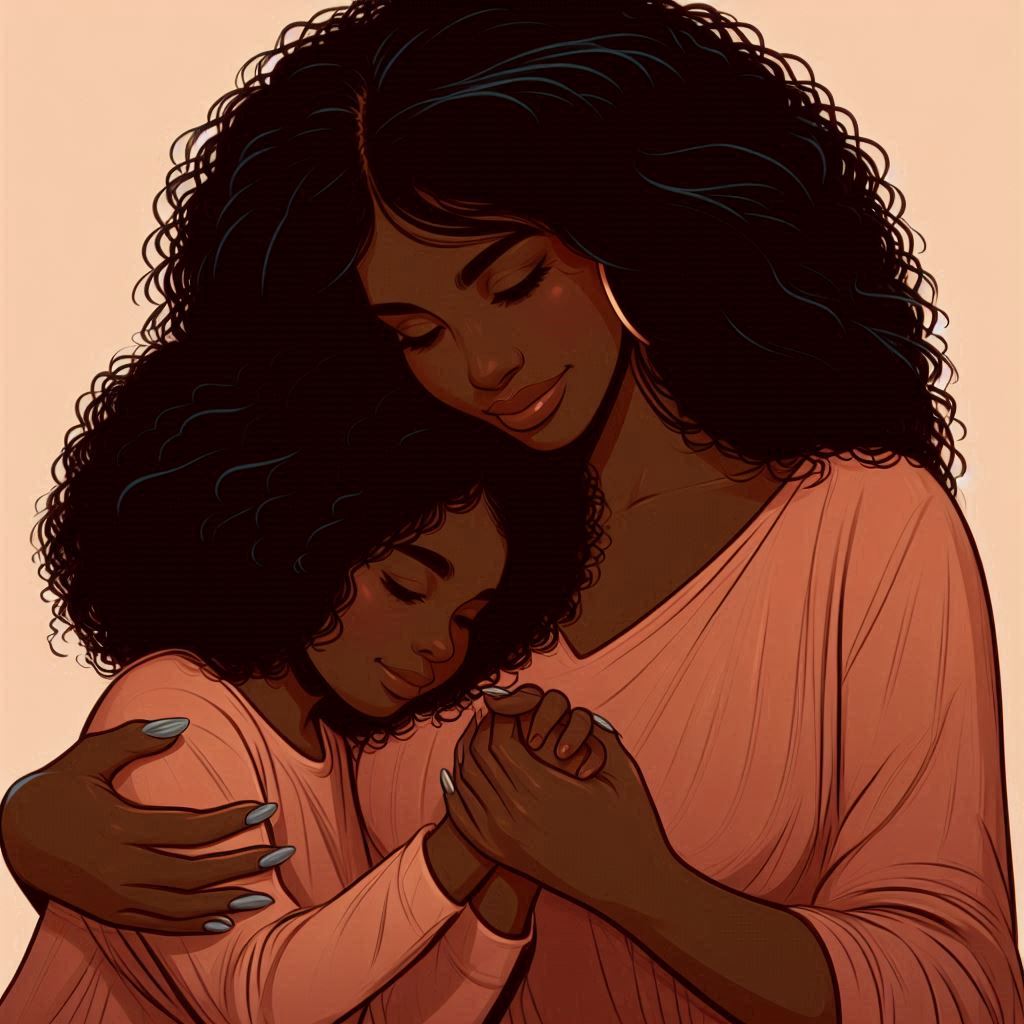
An image by Dall-e 3 of a black woman hugging her inner child. According to PsychCentral, they defined toxic childhood as a period in a person’s childhood that has unfavourable experiences that affect them later in their adulthood.
Examples are:
- You experienced different forms of abuse- verbal, emotional, psychological and sexual.
- Your parents were overprotective, controlling or neglected.
- You didn’t feel supported and received a lack of validation from parents or other authority figures.
- Your emotional needs weren’t met.
1. Love is Conditional
If your parents never showed you affection, chances are that they grew up in a household where affection wasn’t prioritised.
In addition, you don’t know what love is unless you watch films and TV shows, because that was never shown to you growing up.
If we were taught that love is conditional, then this means parents will show you love if you obey them or do well in school. If that was your understanding of how your parents show love, then it is very negative because this could affect you when you start to have relationships with other people.
This implies people pleasing, which is something that doesn’t make us look and feel confident. There is a song called Show Me Love by Robyn, and as I got older and started to understand the song, she was talking about love as a behaviour, which made me realise that the concept of love is a behaviour.
This affects black women because we watch and we hear stories online about black women in unhealthy relationship dynamics where there is the “struggle love” and “ride or die”, which is a disastrous form of showing love and doesn’t benefit black women in any shape or form.
The struggle love idea is too rampant, and it tells black women that we have to ride or die for a male partner who doesn’t show any love towards black women and ride or die for a partner who doesn’t even treat them right, let alone respect black women.
Now that we understand how the concept of love shapes our understanding of how we think of ourselves, what we can do is think about how we give and receive love. One thing you can start doing is to practice self-compassion. Looking back, I realised I didn’t practice self-compassion, and it’s easy enough to ignore your needs. Now, saying affirmations about yourself in the mirror and taking yourself out on solo dates, even starting a hobby, is one way to start healing from the lack of affection and unlearn and reset your life.
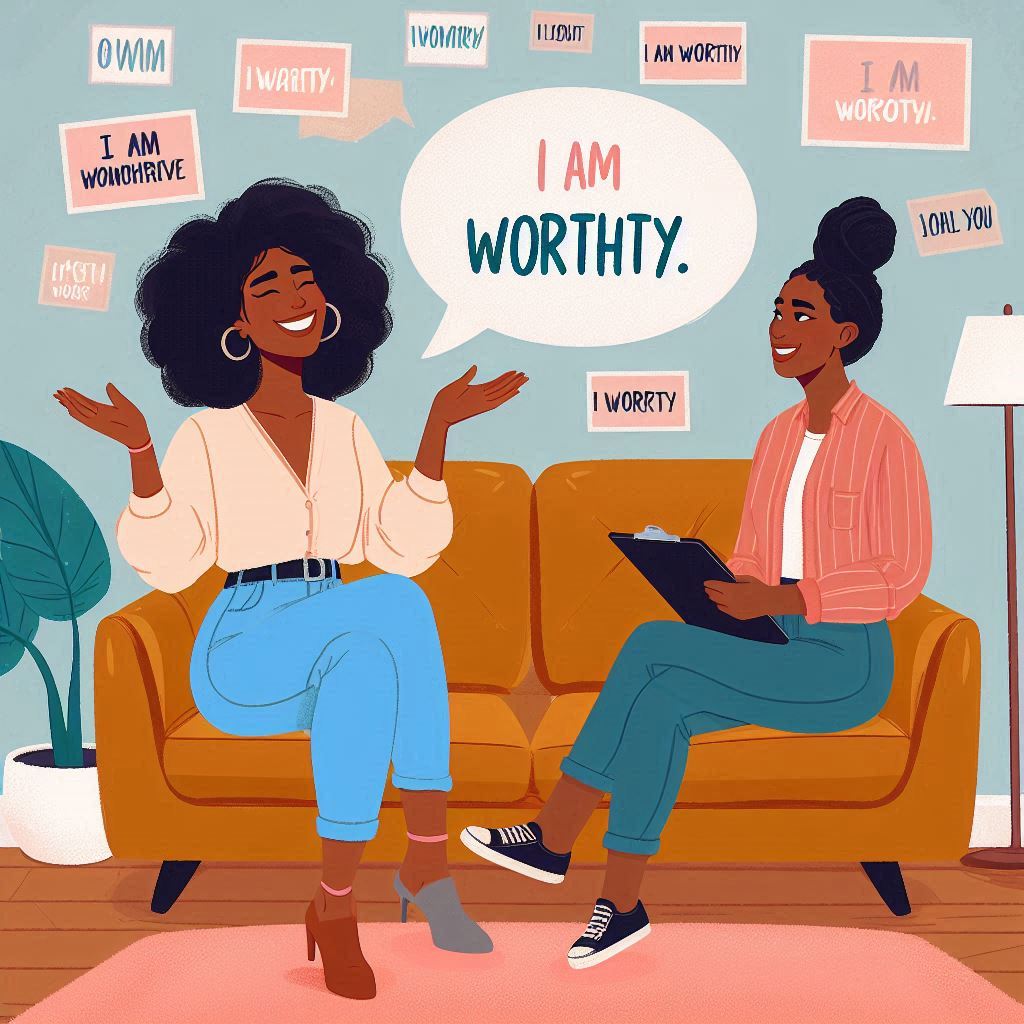
2. Hiding Your Feelings
The second toxic behaviour to leave behind is hiding your feelings. The lack of emotional expression is an unhappy state of mind to be in and affects mental health and confidence. This teaches people at a young age that hiding how you feel is normal, and that is not the case. It normalises the pain and glorifies the idea of hiding your feelings and suffering in silence.
One self-care tool that helps is attending therapy, there are plenty of affordable and free counselling services available for black women. For example, in Manchester, the Windrush Centre offers free therapy. This was the first therapy service that I used, thanks to my sister’s recommendation, and it helped me start my healing journey.
3. Unlearning silent treatment
Another toxic behaviour that we have to unlearn is silent treatment. This was mentioned in a previous blog post about toxic African mothers, but silent treatment is a tactic African parents use to punish their children. Instead of communication, they use silence as a way to show their true emotions.
Silent treatment is not the best way. If there is conflict, the best thing to do is to remove yourself from the situation and reflect on what happened and then try and speak to the person.
With toxic parents who don’t prioritise communicating with their children, it’s difficult, and that is one of the challenges of dealing with toxic African parents- they don’t talk about things with their children openly.

An image created by DALL-E 3 showing a black woman walking down a sunny path. 4. Rest Is Not Prioritised
Another toxic behaviour we are leaving behind is not resting. We know the importance of rest, but growing up in a household where you had to do something. If you weren’t doing anything, most likely they would give you something to do.
This implies that we have to do something all the time, and one thing that you don’t think about growing up is the value of rest, and that is something you start to understand as you navigate adulthood.
5. How Not To Argue
Another toxic behaviour we are leaving behind is how not to argue, as in you can’t speak up or state your own opinions because your parents’ opinions matter more than your feelings.
Have you ever had a conversation with your parents or one of your parents, and you were talking about some things and you had different opinions, but it felt like your parents were trying to “win” the discussion, and you felt drained and decided not to continue because it’s not worth your energy.
6. Projection
Another thing we are unlearning and letting go of is allowing our parents’ projections to affect our mental health. This is where your parents like to project their problems onto their children and take out their anger on their children.
This can cause guilt because children may feel obliged to take on their parents’ problems, and may even lead to parentification, where the children are taking care of their parents.
This is making sure we remain unaffected by our parents’ demands because, at the end of the day, we should never allow our parents’ projections to affect our emotions.
7. Lack of emotional connection
The lack of emotional connection between adult children and parents is shocking when you haven’t felt supported growing up, and you didn’t feel like they cared about your interests and were never interested in getting to know you as a person.
As an adult, you learn to understand the importance of developing emotional connections with other people and how important it is to check in with yourself.

An image of a beautiful, dark-skinned black woman holding up a NO sign to set boundaries. 8. The constant justification
Have you ever felt like you had to explain why you are doing something? Some examples could be where you are going, going to the bathroom or why you are dressed in a certain way or wearing your headwrap a certain way.
It’s these little things that make things look bigger than what it is, and there is no need to always justify why you are doing things, and some things don’t need explanation.
9. Always be available
Another lesson to unlearn is that you don’t have to be available to them 24/7; you are not required to be available to your parents all the time.
You are not their chauffeur, receptionist, translator, maid, cleaner or chef. This is why boundaries are important, and not being taught boundaries at a young age is concerning because it is boundaries that you can keep your energy in check.
Final Thoughts
I appreciate the fact that you took your time to read this blog post. If this article moved you, then don’t forget to comment below about how you felt about this article. I want to start a conversation between black women on ways we can unlearn and heal to live our best lives. It fuels my mission of elevating and empowering black women. Let’s take it further and reclaim our narrative together.
-
Toxic Black Father-Daughter Relationships: A Closer Look
Disclaimer: This article is an educational content based on providing information. I am not a qualified psychologist or a mental health professional. This has been written to the best of my knowledge and it may contain some errors and omissions. I have the right to change the focus of my blog at any time. Read this at your own risk.
Introduction
Delving into the 3rd topic of the toxic parenting series, this topic of toxic black fathers is essential because you don’t often hear about toxic African fathers in the black community. When fathers are physically present and take an active role in playing and communicating with their children regularly, it is beneficial for their children.
The assumption is that there will be a close relationship when there is a father in the house, this isn’t always the case because there are fathers who can be toxic, and emotionally immature and this can create a miserable environment that rejects emotional expression.
One thing we need to examine is the poor relationship fathers can have with their children and the presence of toxic masculinity in the household.
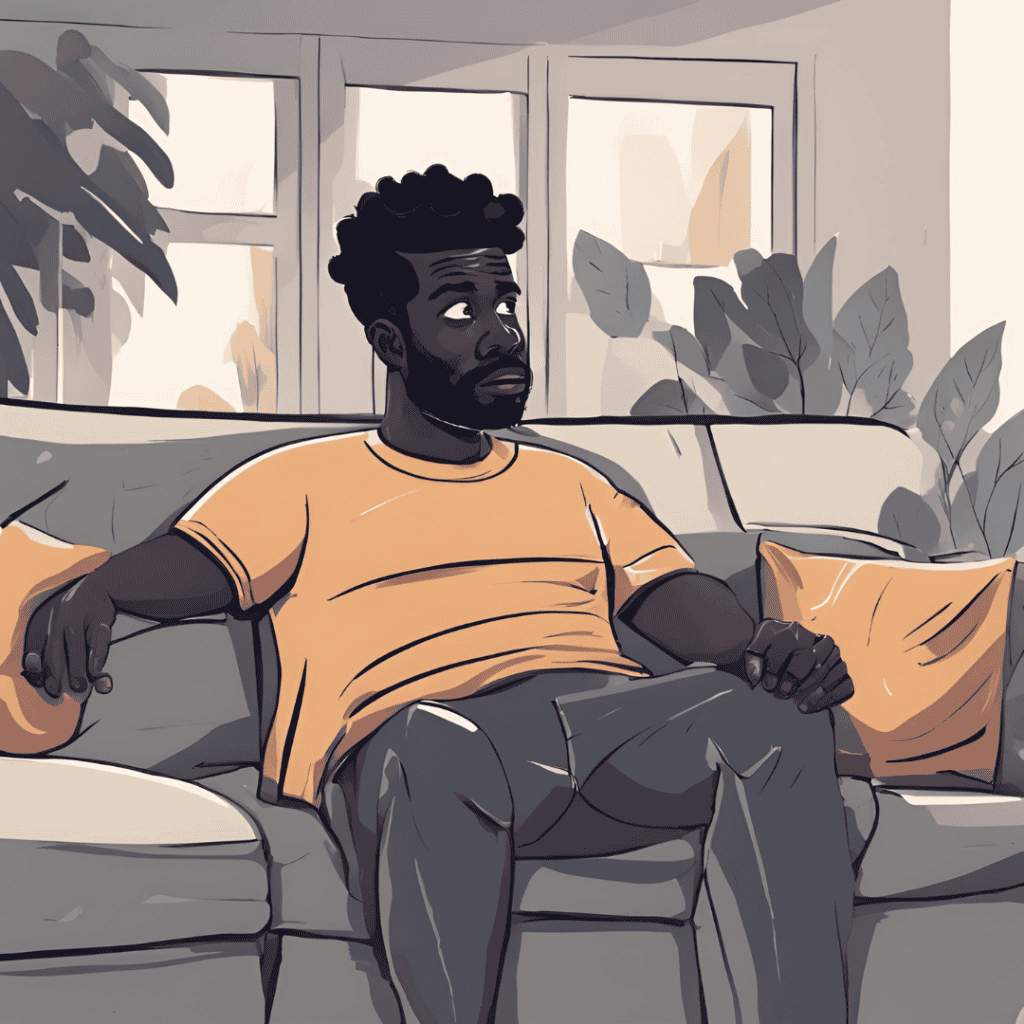
A black man sitting on the couch wearing a tan T-shirt and grey joggers. What Is Toxic Masculinity?
According to Psychology Today, “toxic masculinity is a set of rules that determines how boys and men should behave in society.” Just so we are clear, there is nothing wrong with masculinity itself, everyone has masculine and feminine energies and we need the balance.
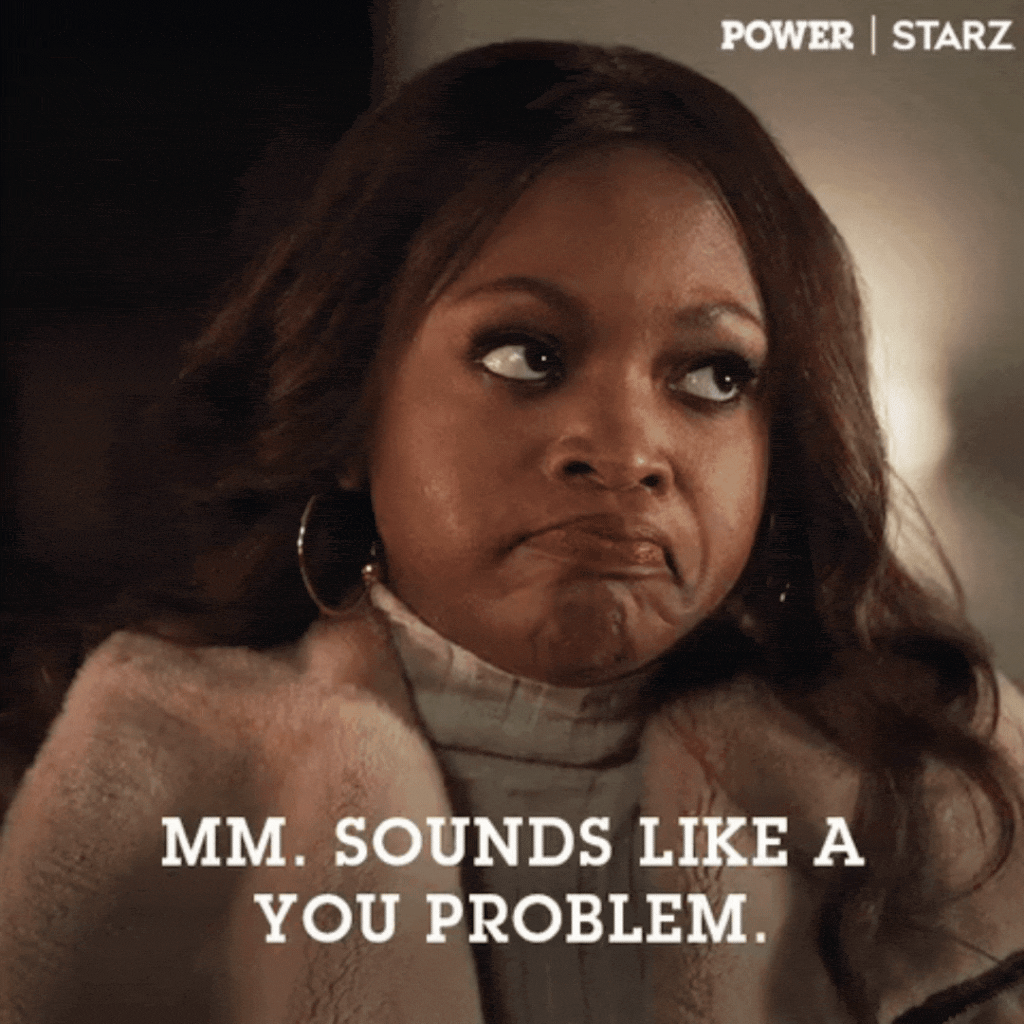
A gif from Giphy on Canva of Tasha from the crime drama show Power saying mm, it’s a you problem. The New York Times and Psychology Today listed the rules of toxic masculinity:
- Have to be tough
- Aggressive
- Hiding emotions and distress
- Suffer in silence
- Shouldn’t ask for help or seek comfort
These set of rules have taught men that emotional expression is a weakness that connecting with your emotions is wrong and that boys don’t cry.
We know the importance of making emotional connections, when people are not allowed to cry or given space where they can express themselves it leads to severe issues.

An image illustrated by AI on Canva of a young teenage girl sitting on the stairs looking sad. What Are The Origins Of Toxic Masculinity?
In the 1980s, a psychologist called Shepherd Bliss analysed the idea of toxic masculinity by separating the positive and negative traits and used the term toxic masculinity as a way to differentiate the characteristics.
The results of the negative traits included “avoiding emotional expression, the need to be physically and sexually dominant and degrading women’s right to have ownership over the bodies.”
This is interesting because this study highlighted how toxic masculinity is present today and influences patriarchy because men control society, and they are the majority of governments globally including controlling the right for women to have ownership of their bodies toxic masculinity also affects people from the LGBTQ community as well.
An example of that is abortion rights and how difficult it will be for women especially black women to have access to clinics where they can have safe abortions in the USA. Men have advantages in society simply because they are male which is why they earn more money than women.
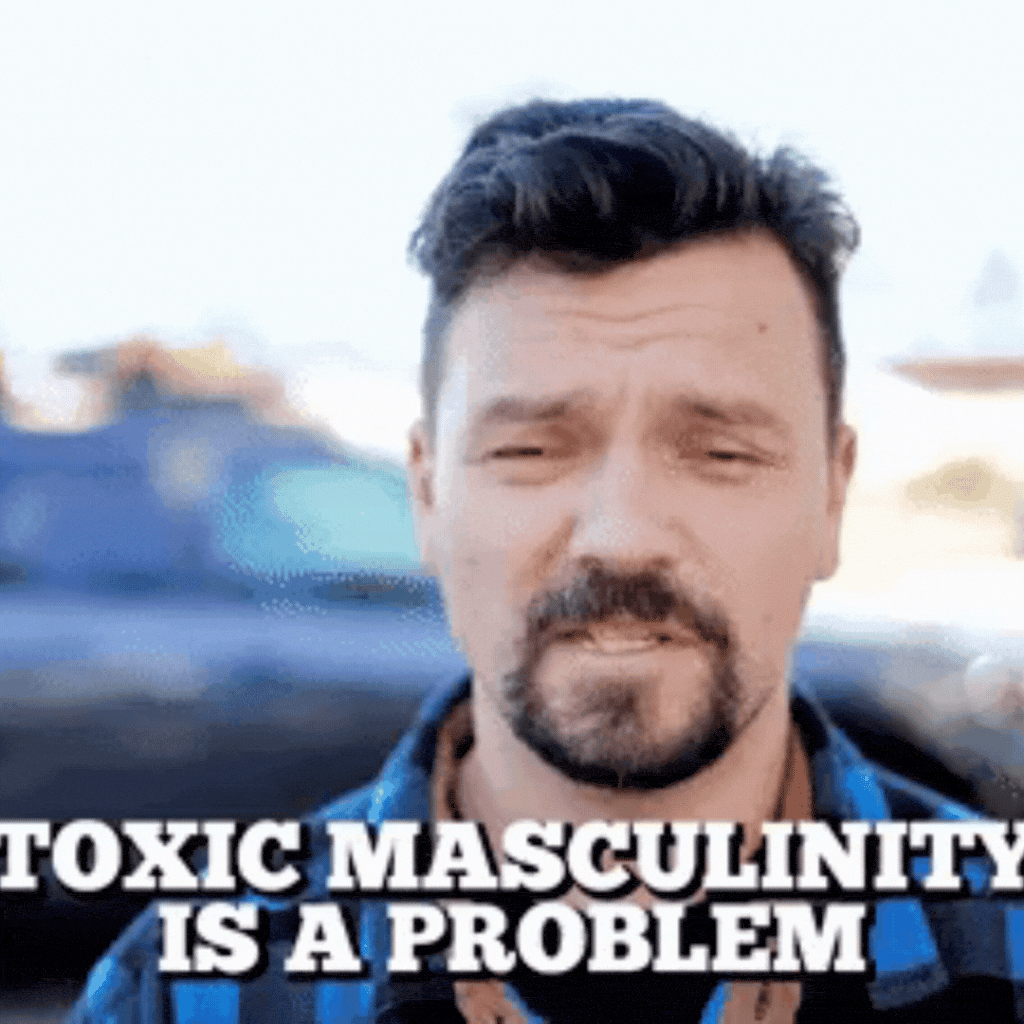
A GIF from Canva of a white, bearded dark-haired guy saying that toxic masculinity is a problem. Addressing Toxic Masculine Traits in African fathers
According to VOA, Trevor Davies, the director of the African Fatherhood programme has urged black men to start taking an active role in fatherhood and not let toxic masculinity stop them from bonding with their children.
Furthermore, toxic masculinity has led to severe consequences such as gender-based violence, sexual violence and femicide which affects women globally especially black women who have to deal with these issues in some African countries. It has also been linked to the overrepresentation of men in prisons in the USA.
An article by New Lines Magazine stated that there is a growing issue of the manosphere in Kenya and South Africa. This is a group of dangerous, misogynistic men that sit online to degrade women and in the black community they disrespect and advocate for violence against black women; and do what they can to paint us as the problem when in reality it’s black men.
This is essential because there is already a huge problem of violence against women and femicide in Kenya and South Africa and there is a huge problem of sexual violence against women in the east of the Democratic Republic of Congo.
Toxic masculinity is a global issue because it is affecting everyone including father-daughter relationships in black communities. The traits and signs of a toxic father make it very difficult to form a relationship with an emotionally immature parent.
The fact that a father is willing to harm his own family whilst children are growing up, shows that there is no love, if someone abuses you there is no love, only control.
Toxic fathers who are toxic don’t spend enough time with their children, actively trying to get to know them instead there is patronising, blaming, lack of accountability, manipulation and control.
If that’s what toxic black fathers think it means to be a father, then they are truly mistaken, it doesn’t help with the fact that other factors contribute such as media, parents/upbringing and culture.

A GIF from Canva of a black man saying that you’re supposed to be rugged and tough. The Signs Of an Unhealthy Father-Daughter Relationship
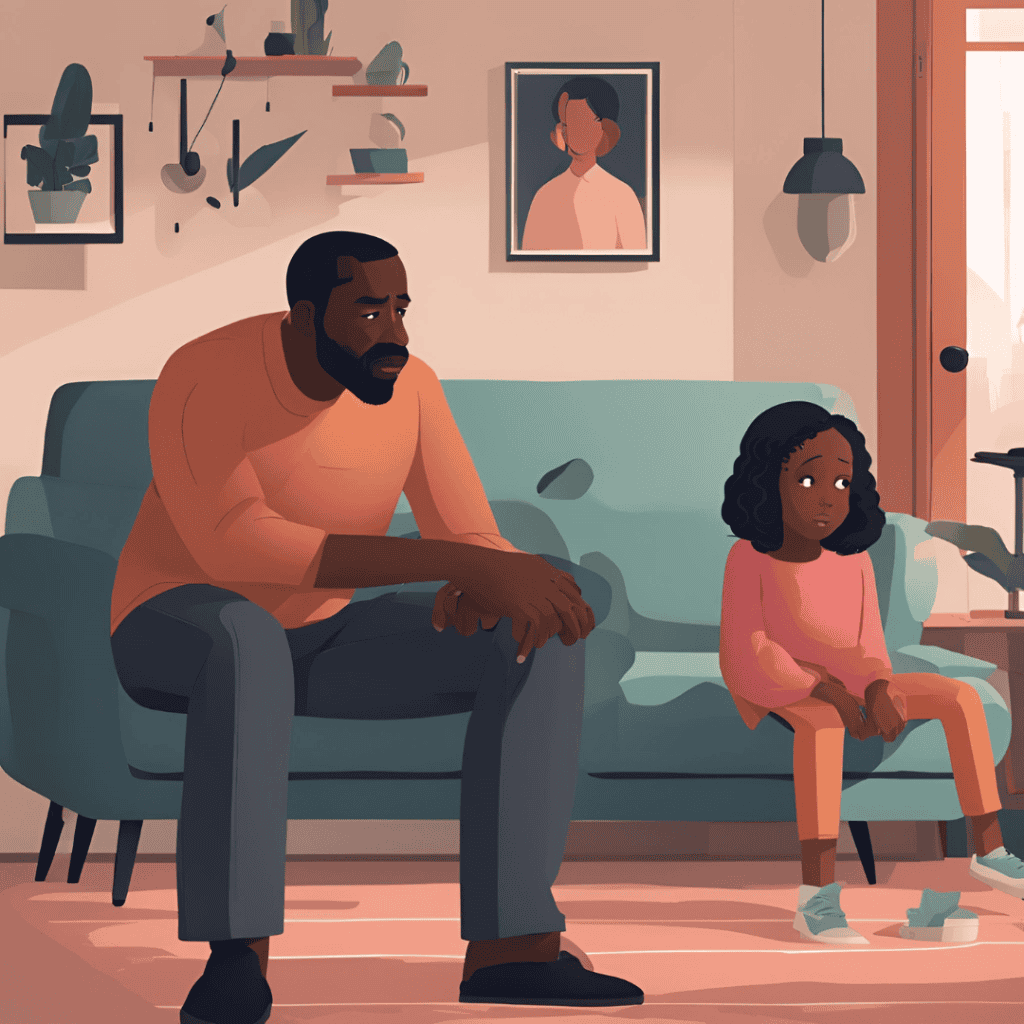
An image generated by AI on Canva shows a black father sitting on the couch with his daughter. An unhealthy father-and-daughter relationship affects both the daughter and the father because the father hasn’t spent the time getting to know his children.
If his daughter is only getting negative behaviours from her father this results in the daughter who is now an adult not wanting to be in the same space as him.
Toxic fathers do not create a healthy environment where children can speak up and have their emotions validated and appreciated.
The Minds Journal included a list of signs to look out for:
- Abuse- If you had to give yourself some reassurance before you dealt with your parents and you walked on eggshells- that is a toxic sign.
- Not present emotionally- if a father is physically there and not emotionally connecting with his child then this means that he’s closed off and suppressing emotions which was highly likely taught to him when he was younger. If he’s never expressed his emotions openly or never hugged you or said I love you that is a clear sign that toxic masculinity has been passed onto him.
Psych2go added the lack of open communication- this is another clear sign because toxic African parents do not let their children have their own opinions let alone argue with them. The avoidance of emotional connection has made it difficult to connect with fathers on a deeper level which leads to broken relationships.
PureWow added other signs that affect father and daughter relationship:
- Feeling annoyed after spending time with him– if you have spent time with your father and you felt shamed, blamed, patronised or you were trying to suggest something helpful to him and that was dismissed then this is another reason why you avoid being in his presence.
- Insists on being right– he thinks his opinions matter, he’s never wrong he can mention other people’s flaws but will never admit to his flaws and traits and never take accountability for the way he raised his children.
- Selfish– Toxic fathers who are selfish do not and never consider other people’s feelings and make assumptions without understanding the child.
- Controlling– Toxic fathers are very controlling especially when it comes to clothing. There is an issue that needs to be spoken about when it comes to wearing shorts. What is it about wearing shorts that leads to disapproval and it’s not just the father’s disapproval? Even the mother can contribute to the control of their children. It has to do with controlling his daughter and only wearing clothes that are suitable for the parents which is another issue itself.
The psychological effects of growing up with toxic fathers
An unhealthy father-and-daughter relationship affects both the daughter and the father because the father hasn’t spent the time getting to know his children. The environment that was created didn’t encourage a healthy environment where children were able to speak up and have their emotions validated and appreciated.
Final Thoughts
Toxic parenting is influenced by toxic masculinity in African countries and it will continue to be an issue until there is more discussion on how toxic black fathers affect their daughter’s mental health and why it is essential to take an active role in your child’s life.
I’ve learned that it’s up to the father to make changes and that there is no point in trying to change them, they have already made their decision. What black women can do now is to start and continue healing and take steps to live a life that is beneficial for us, move forward and leave behind the toxic upbringing.
Thank you for reading this article, I hope you enjoyed reading this article and found it relatable to you. If there is a black woman that you know can benefit from this article, then feel free to share this article to them.
Don’t forget to comment below and let me know your thoughts about this article.
-
How Toxic Black Mother And Daughter Relationships Affect Black Daughters
Disclaimer: In this lifestyle blog, this article contains the blogger’s opinions and is written for educational purposes. The information that has been written is accurate to the best of my knowledge and may include some errors and omissions.
I am not a psychologist or another type of mental health professional. I reserve the right to change how this blog is being managed and the focus of this blog may change at any time. Read at your own risk.
What is emotional abuse?
Emotional abuse is a pattern of damaging behaviour that reduces self-esteem and self-confidence in children and adults. Bustle defined emotional abuse as including behaviours related to verbal abuse such as “belittling, shaming, demeaning, name-calling, teasing, silent treatment, yelling and ignoring a child.”
Also, the Mind Body Green blog stated that this type of psychological abuse affects the self-worth of children and ignores their experiences and feelings. Emotional abuse is using emotions to control children which attacks their mental health.
The Insider indicated that “the parental emotional abuse can leave wounds on the adult.” The study shows that 36% of adults experienced emotional abuse during childhood and added that most perpetrators of emotional abuse are 53.7% women and 45.3% men.
This is interesting because the statistics show that some women tend to be more emotionally abusive to their children. It doesn’t mention the racial groups, the ethnicities and the socioeconomic groups of the participants.
Based on BetterUp, childhood trauma is when “a child is exposed to a traumatic event or experience a traumatic behaviour.” An example of witnessing a traumatic event can be domestic violence between their parents and another example of experiencing trauma can be sexual, physical or emotional abuse.
This article explores emotionally abusive African mothers and the relationships between toxic black mothers and daughters.
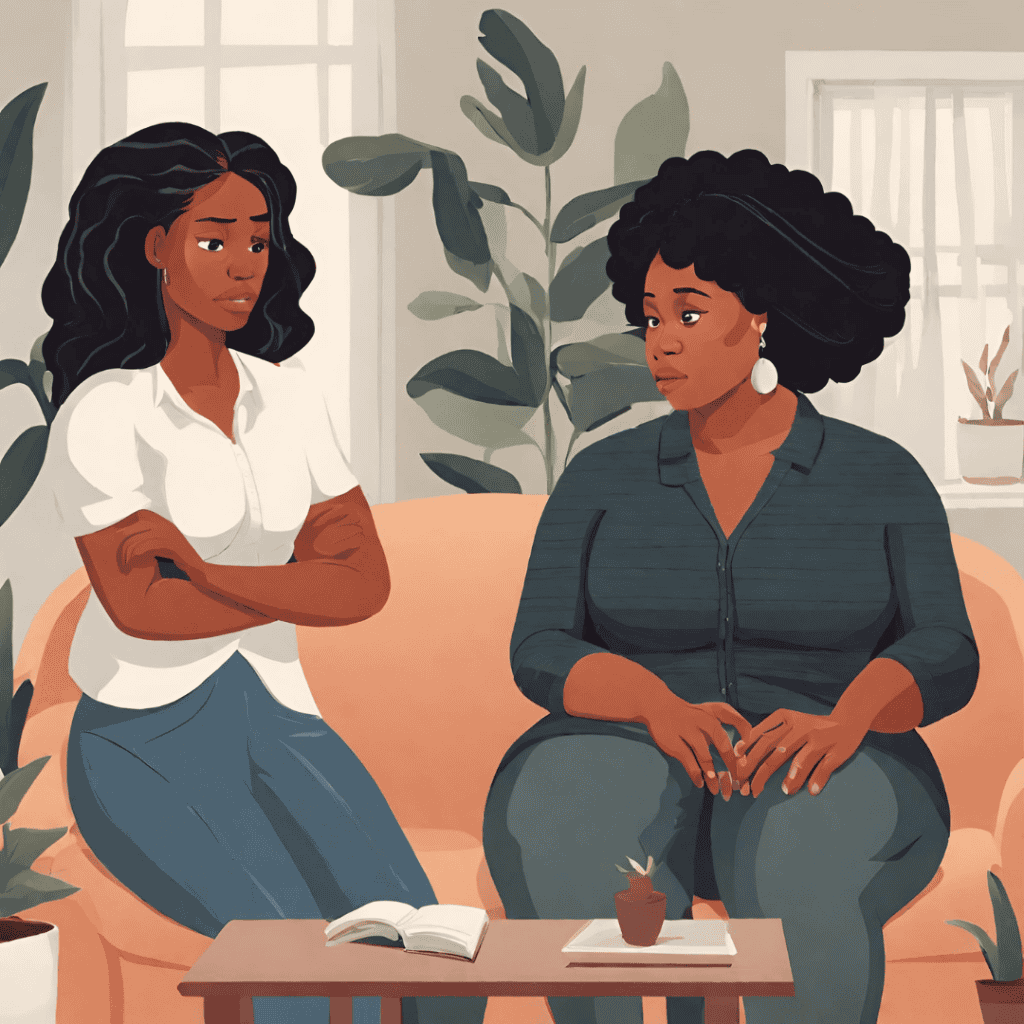
An illustration generated by AI on Canva of a black daughter and black mother sitting on the couch. Her daughter has her arms crossed. Why are some black mothers emotionally abusive?
Research by Live, Love and Bloom explored the reasons why a toxic mother would display toxic behaviour that is damaging to her children and why she would emotionally and verbally abuse her children with no remorse.
Here are a few reasons:
- Childhood trauma– the article suggested that mothers may have experienced childhood trauma when they were younger. This would make sense especially if some mothers were exposed to traumatic events such as physical or emotional abuse that has affected them in adults and haven’t healed from the trauma.
- Poor relationship with a maternal figure– if a black woman had a poor relationship with their mothers or stepmother or another family member. This may show that they haven’t been able to develop a close relationship with the maternal figure, and this has led to the mother not having a close relationship with her children especially if she only has daughters.
- Mental health conditions– If someone has mental health conditions such as depression and anxiety, this can be linked to upbringing, the culture they grew up in and how they dealt with mental health issues.
- It’s common knowledge that there is a stigma in the black community when it comes to talking about mental health. Even though we are seeing more of the younger generation of black women who are accessing and going to therapy, the stigma is still there.
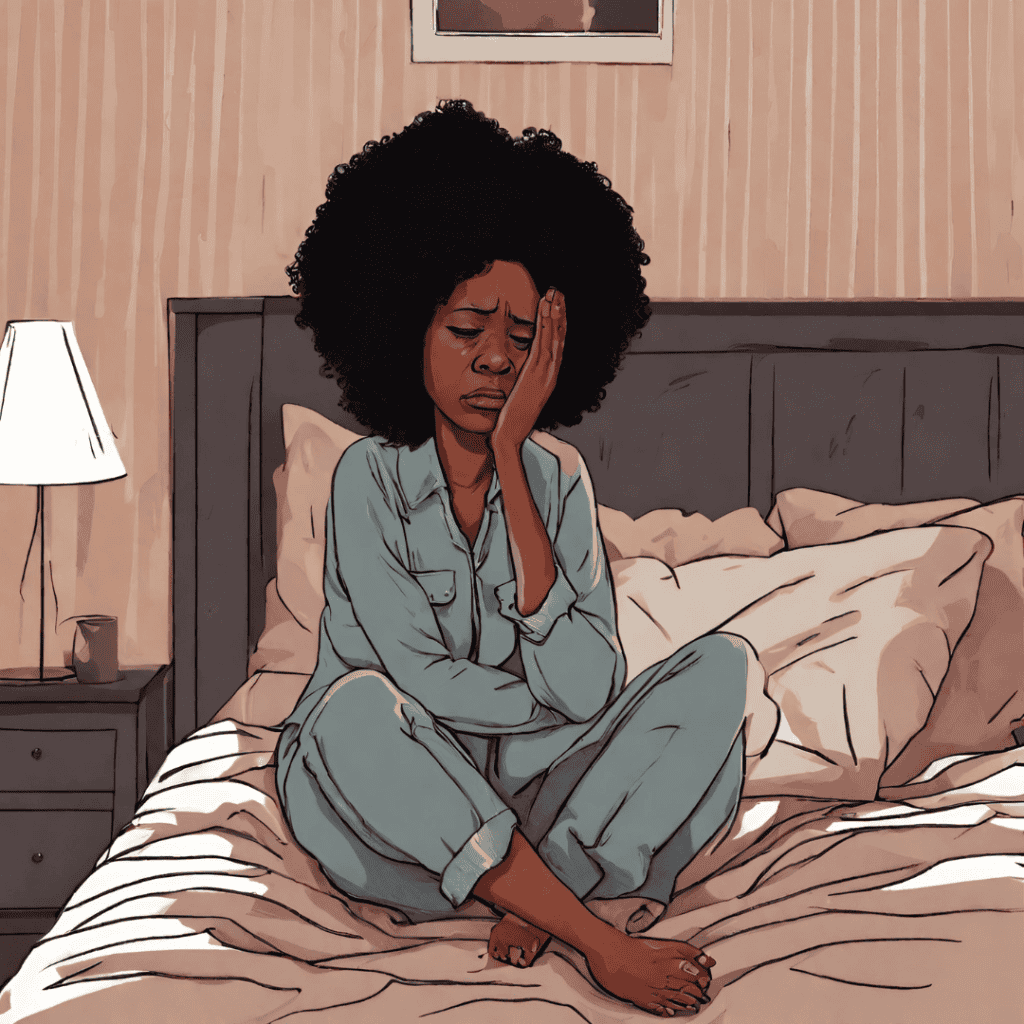
An illustration generated by AI on Canva of a black woman with an Afro wearing grey-blue-ish pyjamas looking upset. On the other hand, Bethany Webster uses the concept of the inner child to explain why some mothers emotionally abuse their children.
She explained that a lot of the abuse that her adult children experienced has to do with their mother’s inner child who hasn’t healed from the childhood trauma. They have an inner child who didn’t receive the same love and affection from their parents.
When black toxic mothers do not nurture their relationships with their daughters, the daughters may resent the toxic African mothers because they have not prioritised the time or made an effort to build a relationship with their children.
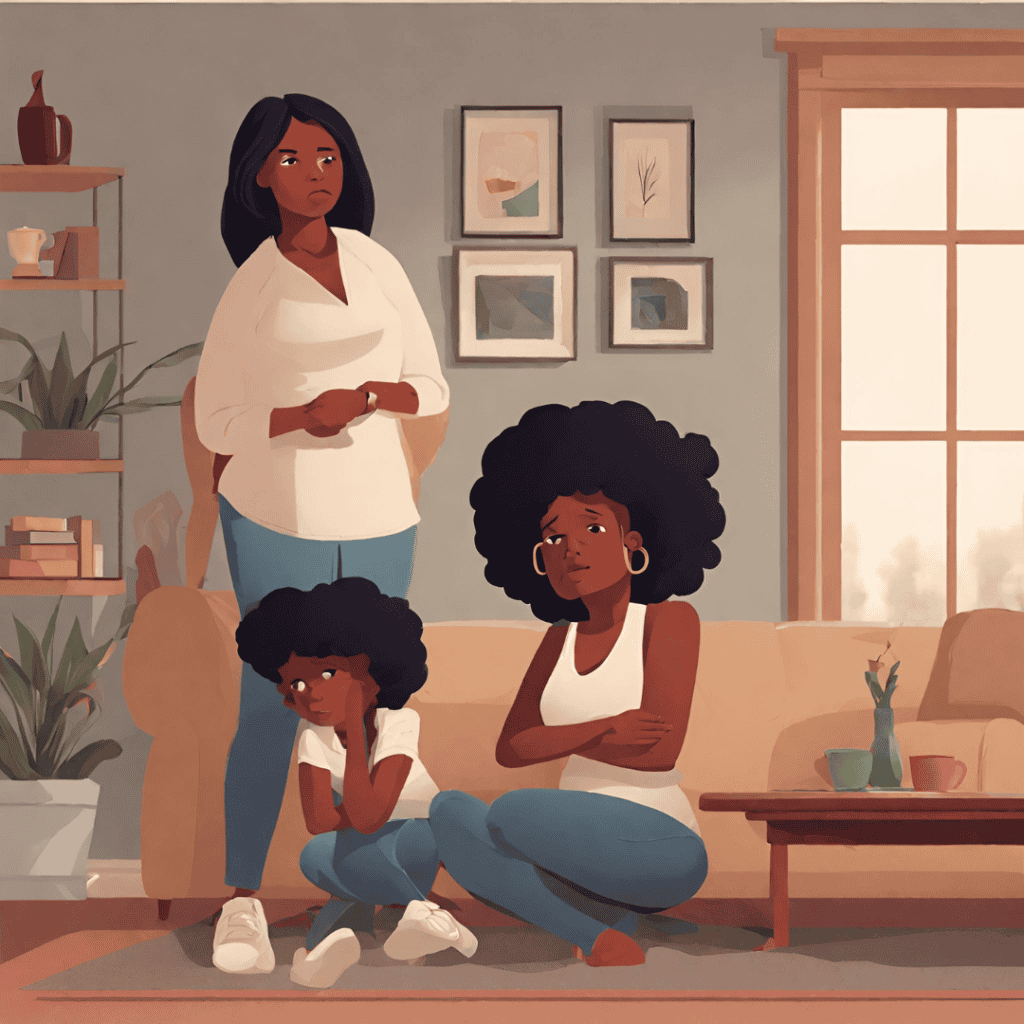
An illustration generated by Canva on AI of a black mother and her 2 daughters with her eldest daughter crossing her arms and her youngest child with her hand on her face. What are the signs of emotional abuse?
Your parents lack showing affection– if your parents never expressed affection to you when you were a child, this is because affection was probably never shown to them and it wasn’t the norm. Affection is a normal feeling towards another person, but when their children witness affection between their parents, it can seem strange because they were never shown.
Storytime
If you’re like me and you were raised by toxic parents where affection and showing emotions is never a regular experience, it becomes harder to express yourself because you live in an environment where showing affection was not displayed by your parents.
I remember when I was a teenager and I was at the dinner table in the living room, eating and talking to my older sister. My mother was staring at herself in the mirror and my dad was sitting on the couch watching TV.
And for a brief moment, me and my sister saw a bit of affection my Dad lifted his hand and my mum put her hand into his hand instead of smiling and saying aww- the romantic gesture shook us to the core.
Honestly, we were looking at each other in disbelief and it was awkward because when you have parents that don’t hug themselves or their children, the last thing you would expect is holding hands.
Why? Because our very traditional, African parents who are from the baby boomer generation never hugged each other or held hands.
Lack of apologies– it’s very difficult when your mother doesn’t apologise often because you are not used to them apologising for their actions.
Lack of praise– if you have done well in school, you might get some praise. Other than that, a mother praising her children isn’t something that is done on a regular basis.
Emotional manipulation– this is when the “perpetrator controls the victim emotionally which gives them an advantage over the victim.” This is a type of emotional abuse that has a range of tactics that can be used to control someone’s emotions.
Guiltripping– this is another manipulation tactic where the perpetrator manipulates the victim by making them feel guilty or bad about their decision. The aim is to make them feel guilty so that they can control how they think, feel and act about a decision and when guilttripping happens often- it can turn toxic.
Silent Treatment– This is another form of emotional manipulation where the mother can give her child silent treatment especially if her child has done something that didn’t make her happy. Giving silent treatment is a harsh way to punish someone because you are not allowing the child or the adult to resolve the issue.
Cruel– Some mothers who are angry about something can project their emotions towards their children.
Hide your emotions– if you have parents who are emotionally detached and the environment didn’t create a safe space to have your voice heard then you are more likely to struggle with expressing your emotions.
Teasing– repeated humiliation and insults can affect the mindset of children and adults because they will feel less confident than their peers.
Comparison to siblings– your mother can compare you to other siblings or other girls around your age group asking you why you are not like them.
Gaslighting– this is another type of emotional abuse and manipulation tactic where the perpetrator seeks to confuse the victim by telling them that their experience is invalid or crazy. This can cause confusion that makes the victim question and doubt their reality.
Emotional Detachment/Abandonment– This is when the mother isn’t present in their child’s life as an adult emotionally. However, when it comes to emotions, the parents haven’t healed yet and do not express emotions healthily. This can lead to a barrier between the mother and her daughters because she hasn’t tried to connect with her children emotionally.
Threats of physical abuse– this is a common part of parenting by African mothers. Even though it’s a harmful way of raising her children, this tactic silences her children and doesn’t allow room for disagreement or expressing themselves. Even though it doesn’t happen, black children know the actions that come with suffering the consequences.
Verbal Abuse- when you have been called a bad child or a child that isn’t respectful towards her parents that can make the child feel sad. This can lead to internalising guilt because the child disappointed her parents. Another example is the name-calling and scolding when your African mother tells you that you are worthless as a child which can reduce your self-worth.

A black and white illustration generated by AI in Canva of a black woman sitting on the window sill staring outside the window. What are the effects of a toxic Mother and Daughter relationship?
The effects of emotional abuse can be hurtful especially when it involves psychological abuse.
As you get older your mind has been affected by emotional and verbal abuse which has affected how you behave in society as a black woman. This means that you have low self-confidence and low self-esteem and you don’t think you have self-worth.
We don’t often realise that a lot of the mental health conditions that some people have could be a result of abuse. When you have been abused whether it’s physical, emotional or domestic, it can change the way you see yourself mentally, physically and emotionally.
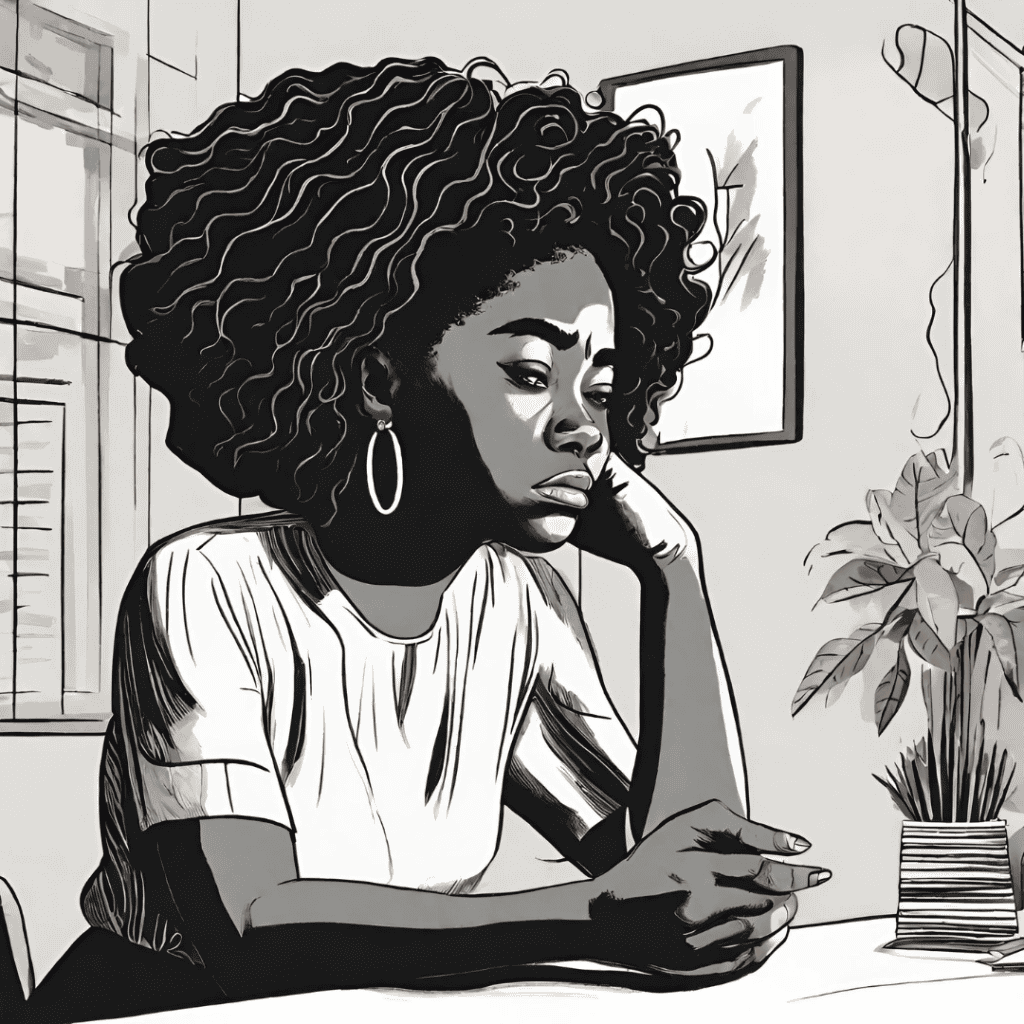
A black and white generated AI illustration from Canva of a young black woman sitting on her desk. Here are some of the effects of a toxic-mother daughter relationship that can develop into adulthood:
Low self-esteem and confidence
Low self-esteem and confidence can stem from criticism, verbal abuse and shaming. If your mother has called you names that hurt your feelings, then your self-esteem will be low and you are not going to believe that you are a confident woman.
Having low self-esteem can impact you especially when you are used to being criticised, shamed and constantly blamed by your parents. You are going to encounter dealing with the inner critic which is the inner negative voice in you that spreads negativity to your mind.
Anxiety
Anxiety plays an important role because African mothers who are toxic use fear to control their children and this makes them scared of their parents as a child which is unfortunate. Living with a mother who used fear to raise her children can cause worry and can lead to her daughter feeling anxious at a young age which can continue into adulthood.
Depression
Concerning Science Direct, the journal article explained that depression, anxiety and childhood trauma could affect the brain and how the brain responds to trauma and mental health conditions. They added that repetitive exposure to abuse can lead to children becoming more likely to develop mental health conditions such as depression.
Imposter syndrome
This is when you feel inadequate about your skills and experience and feel like a fraud. which is a direct consequence of living and growing up as a black woman navigating life in a toxic household.
Loneliness and Isolation
In addition, loneliness and isolation, if you grew up with siblings or as an only child being isolated from other family members in a different city.
Your support system would be your parents and this can feel lonely because you don’t have a strong relationship with your parents so you are less likely to tell them things going on in your life.
If there isn’t an older maternal figure that you can turn to, then you end up keeping it to yourself.
Final Thoughts
I hope this topic resonated with you as a black woman who was raised in a toxic environment. I hope that this can encourage you to start healing, for those who have not yet healed and those who have started to heal from their past wounds.
We know that many black women living in the African Diaspora will most likely have a story about toxic parents who were emotionally abusive. This is a good start to have these conversations online with other black women in your circle who can understand your experience.
This topic isn’t discussed openly in African households especially when it comes to toxic mother and daughter relationships. The generational trauma is passed down and it affects each generation, taking into account other factors such as the country your parents grew up in, the culture, how they were treated in their families, the misogyny and the household income.
A toxic Mother and Daughter relationship is upsetting because a daughter looks to her mum for advice, love and support and when they don’t receive it, it can unravel a whole lot of issues that lead to unhappiness.
I am not saying that every black mother is toxic but there are a lot of black women who have experienced toxic relationships with their mother as a result. There has to be more accountability, awareness, education and therapy to combat this parenting style.
Remember that you cannot change your toxic mother because change is her own decision and you need to make changes for yourself so that you are in a better space mentally, physically, emotionally and spiritually.
Thank you for reading the article, it is part of the black toxic parenting series. I hope you enjoyed reading it and learned something new and helped you realise that you can unpack, reflect and heal on your terms. Let me know what you think in the comments and don’t forget to clap and save this article.
-
How Toxic Parents Affect Black Adults: Addressing The Secret Taboo
Disclaimer: This article about toxic parents is written for educational purposes. I am not a qualified psychologist or a mental health professional. There may be some errors and omissions and this post has been written accurately to the best of my knowledge. Read this at your own risk.
What is Toxic Parenting?
Toxic parenting is a pattern of negative behaviours where parents use fear, manipulation and guilt to control their children. According to Talkspace, toxic parents display negative behaviours that are damaging to their children’s self-esteem, self-worth and self-confidence in children and adults.
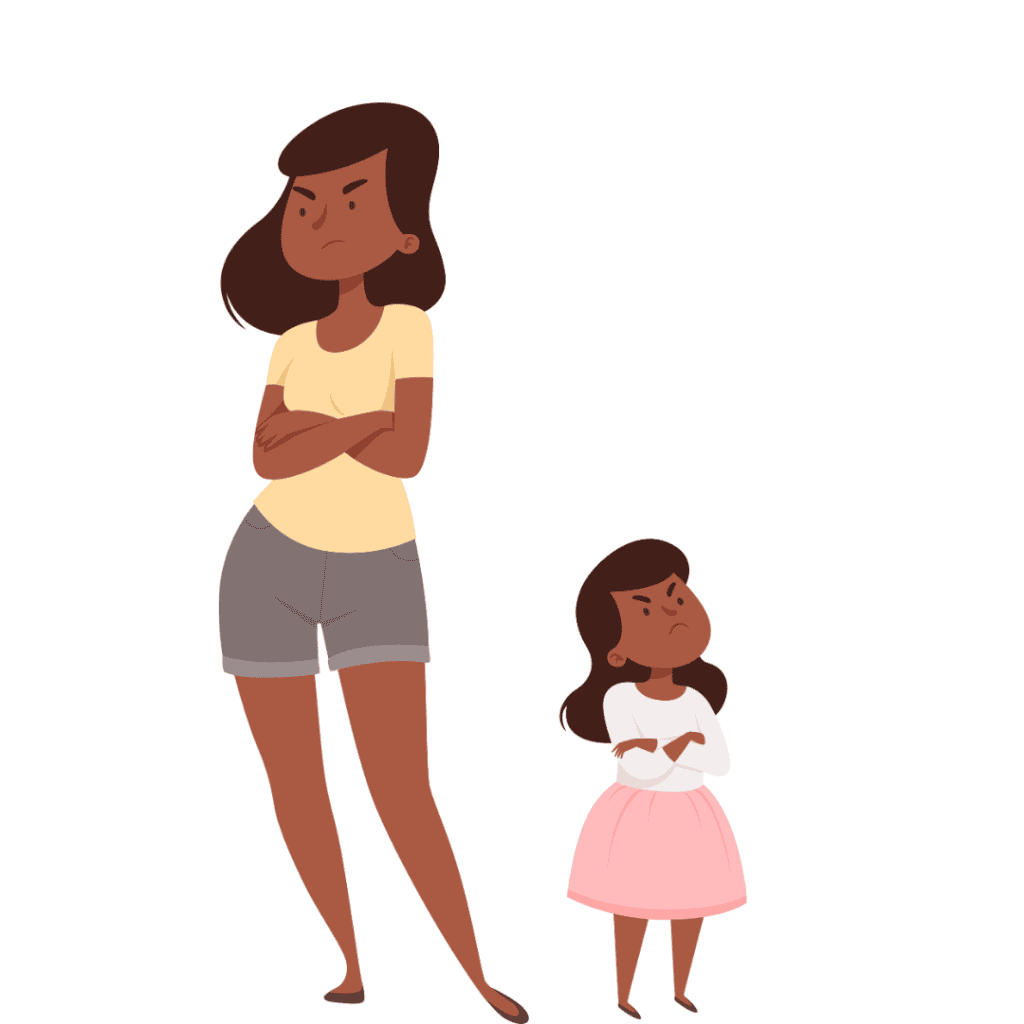
A graphic of a black mother and daughter facing slightly away from each other, feeling angry. A graphic by Crownlab from Canva. What It’s Like Being Raised By a Toxic Parent/s?
Raising children in an emotionally, verbally or physically abusive environment leads to a dysfunctional family; where the repetition of damaging behaviour such as emotional abuse becomes the norm and parents continue to use toxic parenting which can lead to generational trauma.
Toxic parents create a miserable environment for their children and this could lead to children feeling like they are not respected or valued. On top of that, they are not allowed to express themselves and answering back to their parents is frowned upon and perceived as disrespectful.
In addition, toxic parenting by African parents is running rampant and this issue needs to be addressed because it is affecting a lot of black adults in the African Diaspora. Any parent can be toxic regardless of race, but it is too pervasive in the black community.
Nonetheless, toxic parents are more likely to have a broken relationship with their children because African parents who are harmful do not communicate with their children not even getting to know their children and their hobbies. Instead, they focus more on blaming and criticising adult children when as they get older.
Instead of trying to fix the broken relationship, toxic parents refuse to take accountability regarding how toxic parenting has affected their children’s mental health.
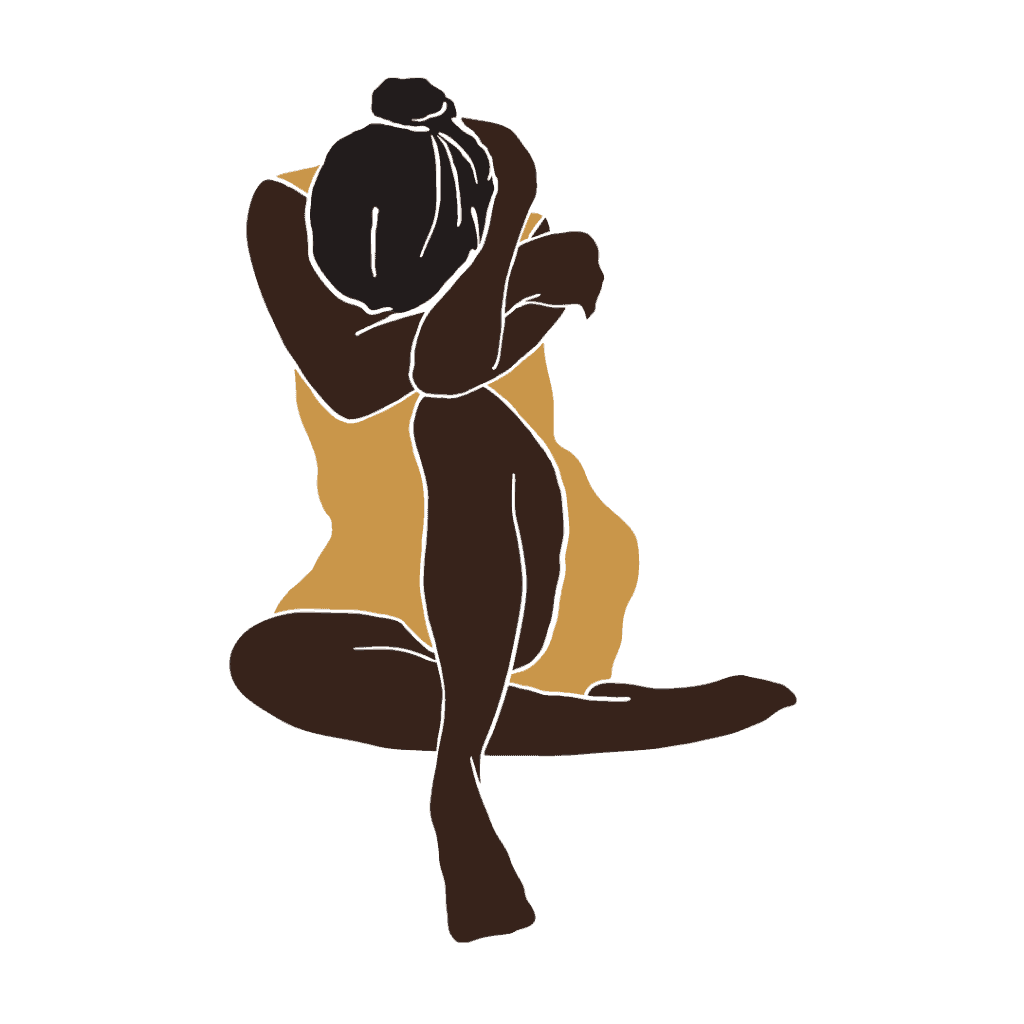
A black woman is feeling sad and covering her face—graphic by Aleksse on Canva. What Are The Signs Of Toxic Parents?
An article by Psychology Today presented a list of 12 questions to help people recognise whether or not their mum, dad or parents are toxic. Here are some traits and signs that may explain their damaging behaviours:
- Emotionally and Verbally Abusive- This type of abuse is harder to recognise and it tends to affect children psychologically. This can include belittling your child, name-calling, calling you worthless and threats of violence. This can affect a child’s self-esteem when they become adults. Other forms of emotional abuse are emotional manipulation and gaslighting.
- Physically abusive- Adults who were raised by physically abusive and authoritarian parents may feel more fearful and walk on eggshells around them
- Criticism- Emotionally detached parents can criticise you on your actions such as how you have your hair, how you dress especially wearing shorts as an adult and if you wear nose piercings they will ask you why you’re wearing nose piercings.
- Emotional manipulation- Toxic parents may use emotional manipulation tactics such as emotional blackmail to get a desired action over their child.
- Control- Their child’s life is controlled in a way that they can dictate what is appropriate to wear in a house even when their children are adults.
- Blaming- They blame their children when it’s not their fault instead of taking ownership of the issue.
- Dismissive of their child’s feelings– This is typical because if parents refuse to acknowledge their feelings, they are more likely to dismiss their emotions.
- Overreact- As an adult, you may have memories of your parents overreacting over something that required them to be more understanding.
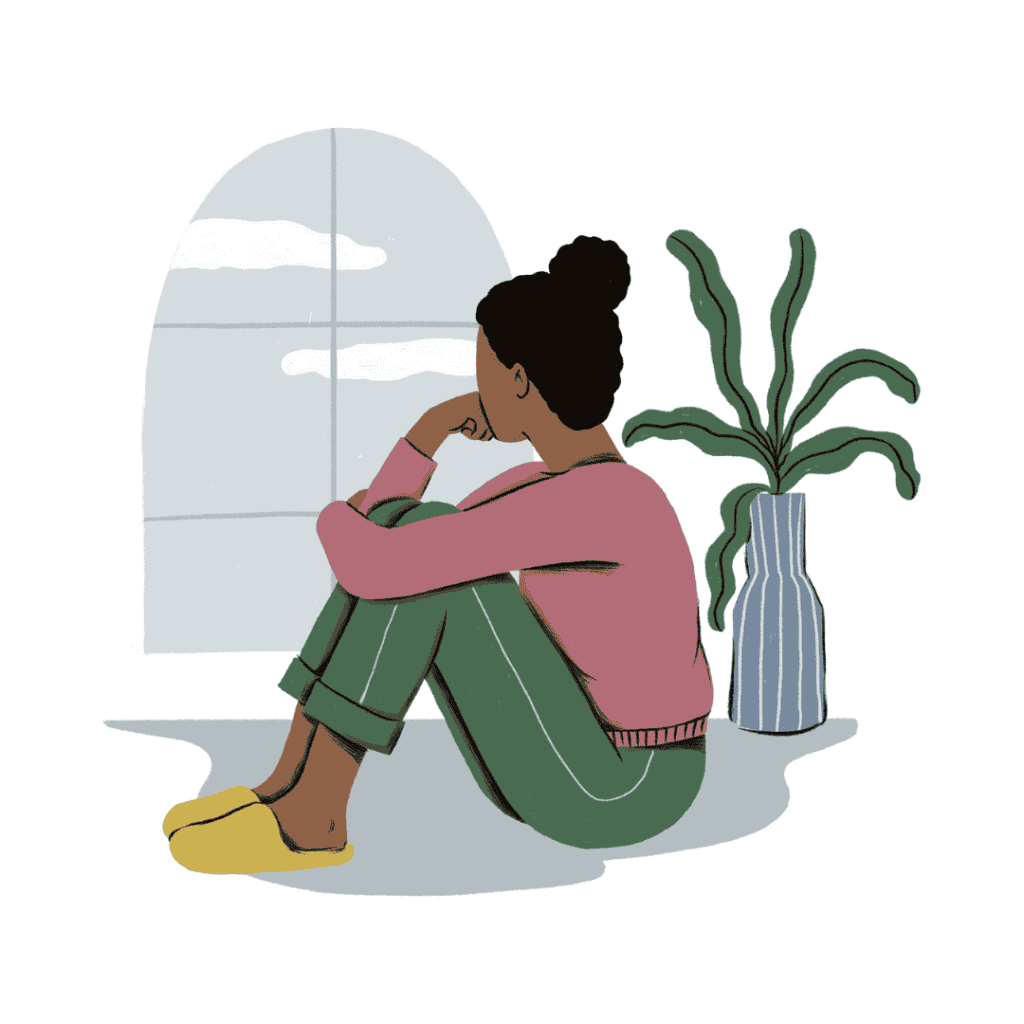
An illustration of a black woman who is depressed looking out the window. Illustration by Craftery Co on Canva. Signs That May Affect You As An Adult
Bustle outlined signs that may explain some of the behaviours that we do as adults:
- Taking failure and rejection too hard- If you see failure as a negative, this may be that you don’t see failure as a way to grow which shows that you are too hard on yourself.
- Avoiding your parents- This could be because of unresolved issues and because you didn’t grow up in an environment where open communication was encouraged, which has allowed you to reduce your contact with them.
- Inner critic- if you felt pressured to achieve higher grades because your parents told you to achieve higher after you failed that can lead to you becoming a perfectionist.
Traits of Emotionally Immature Parents

An illustration of a black woman looking angry. Illustration by Vasile-saptefrati from Canva I read a book about toxic parents who are emotionally immature and the author listed traits of emotionally immature parents that the reader can resonate with as an adult.
- Selfish- Emotionally immature parents don’t see things from other people’s perspectives, they are too focused on their own needs and don’t consider other people’s feelings.
- Lack of accountability- they don’t take accountability for the actions that may upset their children such as hurting their feelings. Instead, they pretend that everything is fine and bury issues under the rug.
- Imposing failed ambitions on their children- some African parents often tell their children that they should work in industries such as working in a bank, being a lawyer or a doctor.
- There is nothing wrong with these jobs, but parents shouldn’t impose their ambitions on their children because they may not be interested in them. It’s important to let them decide what they want to do.
What are the effects of toxic parenting?
Blunt Therapy states that children who were raised by toxic parents who were emotionally abusive are more likely to deal with mental health challenges such as imposter syndrome and may develop anxiety and depression.
In addition, toxic parenting in the black community could lead to distant relationships because they haven’t made an effort to get to know their children or take an interest in their children.
The effects of living with toxic parents are upsetting because someone may display behaviours that they learned from their parents such as giving the silent treatment. This is damaging because we may have picked up negative behaviours that were normalised in a toxic household. It’s important to recognise the steps that need to be taken to connect and express yourself. Healing is an ongoing journey.
Final Thoughts
I’m not saying all African parents are toxic, however, many adults have been affected by their upbringing. Another common thing is that therapy isn’t spoken widely amongst African parents, instead they turn to prayers.
Toxix parents must be held accountable for their parenting style because this isn’t normal. You must be mentally, financially and emotionally prepared to raise children. It’s good to see other black vloggers on YouTube speaking out about their toxic parent’s behaviour.
Thank you for reading this blog post, I appreciate your support and if you are a black woman part of the African diaspora who can relate to this post, let me know what you think about this article and how this has affected you as a black adult.
Book: Dealing With Emotionally Immature Parents: How To Handle Toxic Parents by Priscilla Posey
-
The Unseen Battle: Imposter Syndrome’s Grip On Black Women
Disclaimer: This information is to be read for educational purposes. I am not a mental health professional or a psychologist specialising in imposter syndrome.

A photo of a black woman wearing a white top with looking sad with her hand on her forehead. Photo by Dragan991 of Getty Images from Canva. What is Imposter Syndrome
According to Psych Central, imposter syndrome is when you are doubting yourself and your skills because you feel inadequate and not confident in your capabilities. Psychologists Dr Imes and Dr Clance coined the term imposter syndrome in 1978 based on a study that involved mostly white women from middle to upper-class backgrounds.
These women held senior positions in companies and included medical and college students from different universities, and what they discovered was that these participants had self-doubt and felt inadequate and thought that they tricked people into thinking that they were capable of their roles.

A photo of a black woman with shaved hair looking worried with self-doubt. What are the causes?
Family and Upbringing
Parents can put pressure on their children to achieve high grades especially if they are from an African household where education is highly important. While education is essential, placing a lot of pressure on children can affect mental health which isn’t always considered.
And this can manifest into anxiety and fear as a result of setting high standards. An example of this is when I failed two subjects which were sociology and English Language when I studied for my A-levels at Bury College.
On top of that, I remember going to college with my Mum and discussing the next steps with English teachers. I ended up dropping Sociology and keeping English because I preferred English Language.
As soon as I got home, I had a headache and I remember my Dad telling me to aim for high grades. I took that speech and started to put pressure on myself which manifested into becoming a perfectionist at university.
Personality
There are certain traits that some people have that make them a perfectionist. This could be linked towards people who identify themselves as introverts. This trait can lead to stress due to overworking and overpreparing content, which can lead to tiredness.
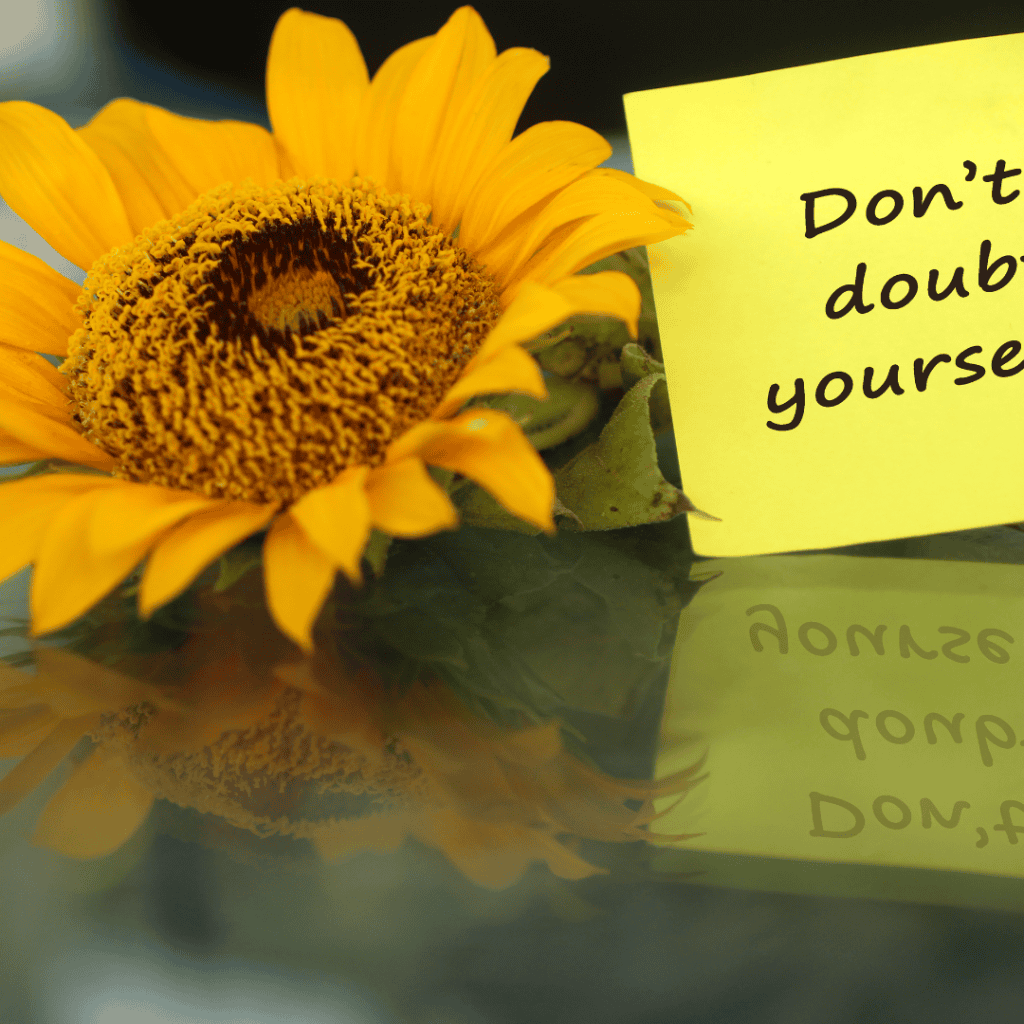
Photo of a self-note Don’t Doubt Yourself by Marian Marganingsih from Getty Images on Canva. How does Self-Doubt relate to feeling like an imposter?
Self-doubt is when someone doubts themselves and their skills. It involves doubting yourself based on negative experiences, situations and different aspects of life.
Also, self-doubt is the main factor behind the feeling of imposter syndrome because you don’t have the confidence to carry out tasks that can help you progress to your next goal.
Statistics of Imposter Syndrome
A study in the Independent revealed that around 4,000 people have experienced this type of self-doubt. 53% of women have experienced imposter syndrome and 72% of women are more likely to have imposter experience at work.
In comparison, 63% of men are also at a higher risk of having imposter syndrome at work. Although this research shows women are more likely to experience imposter syndrome at work. Unfortunately, it doesn’t mention the percentage of black women who also have this form of self-doubt because there are reasons such as microaggressions and being underrepresented at work which can lead to feeling inadequate.
What’s it really like to have imposter syndrome?
The negative thoughts are influenced by an inner critic (it’s like having someone in your head telling you that you can’t do something, spreading doubt into your mind that leads to low confidence). Here are the reasons why imposter syndrome is detrimental:
- It can hinder your growth as an individual, as a content creator
- And this could even lead to past, negative experiences that have already happened that can affect this feeling of incompetence.
- Makes you feel frustrated even though you are aware of your skills and achievements a strong inner critic is reminding you why shouldn’t be doing these things.
- You will overthink things and think about the things that could go wrong.
What are limiting beliefs?

Photo of a handwriting with a cup of coffee. Photo by Marekuliasz from Getty Images on Canva. Some people who have imposter syndrome experience different emotions such as fear, guilt and frustration that can reinforce their limiting beliefs. According to the Happier Human blog, limiting beliefs is a “state of mind or thoughts that you believe are true. “
Here are some examples that I went through during my long hiatus of blogging:
- I’m not a good blogger because I don’t have experience creating content for businesses.
- My writing isn’t good enough or I don’t have any experience in writing so I am going to stop writing.
- I don’t look good on camera and have no idea what to say so I will not record myself.
- I don’t have enough of a large audience so how can I possibly continue blogging?
- My content isn’t good enough so maybe I should stop blogging altogether.
- I wrote 9 blog posts when I first started blogging and eventually, I started becoming demotivated and started to doubt myself. I stopped blogging and didn’t return until this year.
Limiting beliefs relates to imposter syndrome because it is a story based on an experience that keeps you in your comfort zone. This shows how powerful imposter syndrome can be and can get out of control if we don’t tackle it from the beginning.

black woman looking sad with her hand under her chin. Photo by Jessica photos from Getty Images Signature on Canva. The Effects of Imposter Syndrome
The consequences can manifest in traits such as perfectionism, procrastination on tasks, self-doubt and even anxiety.
Feeling like an imposter syndrome is not a mental illness but it can take a toll on you emotionally. Doubting yourself causes you to overthink things and you end up thinking about things that could go wrong instead of doing it.
On top of that, you end up feeling guilty because you are not doing what you are supposed to be doing and it becomes a cycle that is hard to break. And it will take different strategies to overcome it.
When in reality you realise that once you have completed the tasks that were worrying you, you realise that it wasn’t such a big deal.
Perfectionism
Another effect of imposter syndrome is perfectionism. Perfectionism can be detrimental because it doesn’t allow us to think about embracing failures and making errors. It is rooted in always trying to make your work look perfect.
As mentioned by Dr Orbe-Austin, author of Own Your Greatness and a psychologist perfectionism is related to self-doubt because you are always reaching for expectations that are not realistic, not realising that being perfect hurts your creativity, and it will leave you feeling stuck and not go any further.
There is nothing wrong with producing high-quality work, but when someone is a perfectionist it can be exhausting and it involves focusing your energy on setting unrealistic expectations. A perfectionist will aim for their best and when they don’t reach for the goals, they start taking it out on themselves.

An image of an inspirational quote by Marekuliasz from Canva. Signs you may have imposter syndrome
An article by Teachable outlined signs that show a person may be experiencing imposter syndrome. Here are some of the common signs:
- Fear of not living up to people’s expectations
- Setting unrealistic expectations
- Feeling inadequate and don’t believe that you have the skills or experience to create content.
- Sabotaging your success as a result of self-doubt
- Perfectionism
- Low self-confidence
Types of imposters
According to Valerie Young, a renowned expert in imposter syndrome and the author of The Secrets Thoughts of Successful Women: Why Capable People Suffer from It and How to Thrive in Spite of It. In her research, she identified 5 types of imposters :
The Perfectionist
This person tends to want their work to be perfect, sets unrealistic goals and punishes themselves when they can’t meet their goals or have failed to meet one of the goals. Instead of acknowledging the hard work, they take it out on themselves.
The Soloist
According to Simply Psychology, soloists enjoy working independently and believe they can do things by themselves. They believe that asking for help is a sign of weakness and even though they know they can ask for help, they don’t want people to think that they can’t do things by themselves.
Superhero/heroine
As mentioned by the tilt, this person feels adequate when juggling multiple responsibilities and if they can’t manage various roles then they may start to feel like they are a failure because they are not keeping up with being the superperson and feel like they have tricked people into thinking they are the superhero or heroine.
Expert
This person feels adequate by how much and what they know and need to have the necessary skills and qualifications such as applying for jobs. If they don’t know enough about a topic they can start doubting themselves.
Natural genius
This person tends to learn things at a quicker speed and “they tend to put little effort into the work they are doing” and if it takes longer for them to learn or understand a topic, this can make them feel like a failure.
Final Thoughts
There are many ways to overcome imposter syndrome, and another article will discuss how these strategies can help black women who acknowledge their imposter syndrome and want to overcome it.
It starts with self-compassion, knowing your self-worth, and learning from your upbringing because we know that many things have contributed to our self-doubt that can come from upbringing.
It took me a long time to know that confidence is a powerful belief that can change your life significantly. I know that slowly the belief in myself will become second nature.
Thank you for reading my article I hope this will help black women who have imposter syndrome and recognise that everyone can doubt themselves, it becomes a problem when imposter syndrome affects your mental health.
If you enjoyed reading this article, don’t forget to comment and share. If you have any content ideas that can elevate and educate unapologetic black women, let me know in the comments.
Afro Lit Stories


Healing through storytelling, elevating black millenial women, one mindset shift at a time


